Graceful

Julia Rogers: Three Graces (1939 - 1943)
" … each seems willing to show up for the cast party following each performance."
I might not live that elegant of a life, but I aspire to live a Graceful one. Not necessarily a well-choreographed or excellently executed existence, but at least a decent one. The presence of Grace in my life might ensure such a fate, for Grace smoothes over otherwise obvious imperfections. The object of life doesn't seem to be perfection but something much closer to imperfection instead. We seem to be given imperfections with the intention of perfecting them. Not to make them perfect, but, as Lincoln insisted, to make them somehow more perfect than before we encountered them. We try to improve. Not all of our efforts succeed, nor do we necessarily intend to succeed in handling all of them. We fail plenty, then begin again, perhaps more humbly than we initially engaged. There might be more Graceful potential in any odd failure than in any unbridled success. Remember, blessèd are the poor, weak, meek, and destitute. Those in desperate need of Grace seem quite naturally to employ it better.
My summer has been a fairly unextraordinary one.
Weekly Writing Summary For The Week Ending 9/19/2024

Lewis Wickes Hine: Syrian-Arab, Ellis Island (1926)
And Properly So
My Summer Of Discontent coexisted with my writing this Grace series. I see now, as the Summer and discontentment fades, that I spent my summer suffering from one of the more ordinary blindnesses, the one that sees the present altogether too clearly, and so cannot adequately either see past or foresee future. Presence never was an end-all or a be-all, but merely one of the simultaneous states informing and misleading us, in probably roughly equal proportions. The heat gets me but not nearly as thoroughly as I can get myself. I can see in retrospect what I could not even suspect prospectively. Every long-suffering experience quickly turned to dust, the same as every thoroughly satisfying one. I actually accomplished something this summer in spite of or, perhaps, because I was suffering. Summer wrought what summers have always wrought: Autumn, and all the uncertainty that season has ever brought. By the time the next three months have passed, I will have experienced snow again and re-engaged in my annual Seasonal Affective Disorder dance. This could become my Autumn of Discontent, but I've grown weary of discontent. It alters nothing but the quality of my experience. It apparently cannot even chase away Grace, for here, at the very end of my Summer Of Discontent, I hold a completed journal of my experience entitled Grace, and properly so.
Level

Level: Classification Artists' Tools (20th century)
"There once was a crooked man who lived in a crooked house …"
Level amounts to an abstract concept in The Villa Vatta Schmaltz. Built in 1907, the old place has been settling unevenly into place ever since. When remodeling, we must remember that we're restoring relative to what the eye recognizes as Level. That value might differ considerably from what my old Cherrywood Level might propose. An unbalanced roofline was the chief reason we began refurbishing the front porch. When approaching from down the facing street, the house seemed stuck in a permanent shrug, losing at least six inches across the twenty-foot roof line. We'd thought then that the bricks we believed supported the roof were failing, but those bricks were never more than ornamental. They never supported anything. That roofline had been trying to support itself and ultimately began to fail. That it managed to support itself for who-knows-how-long stands as a testament to our good fortune. We might have had to clean up a catastrophic failure instead of merely making the roof line Level again.
As with most projects, this one began under false premises.
Whimpered
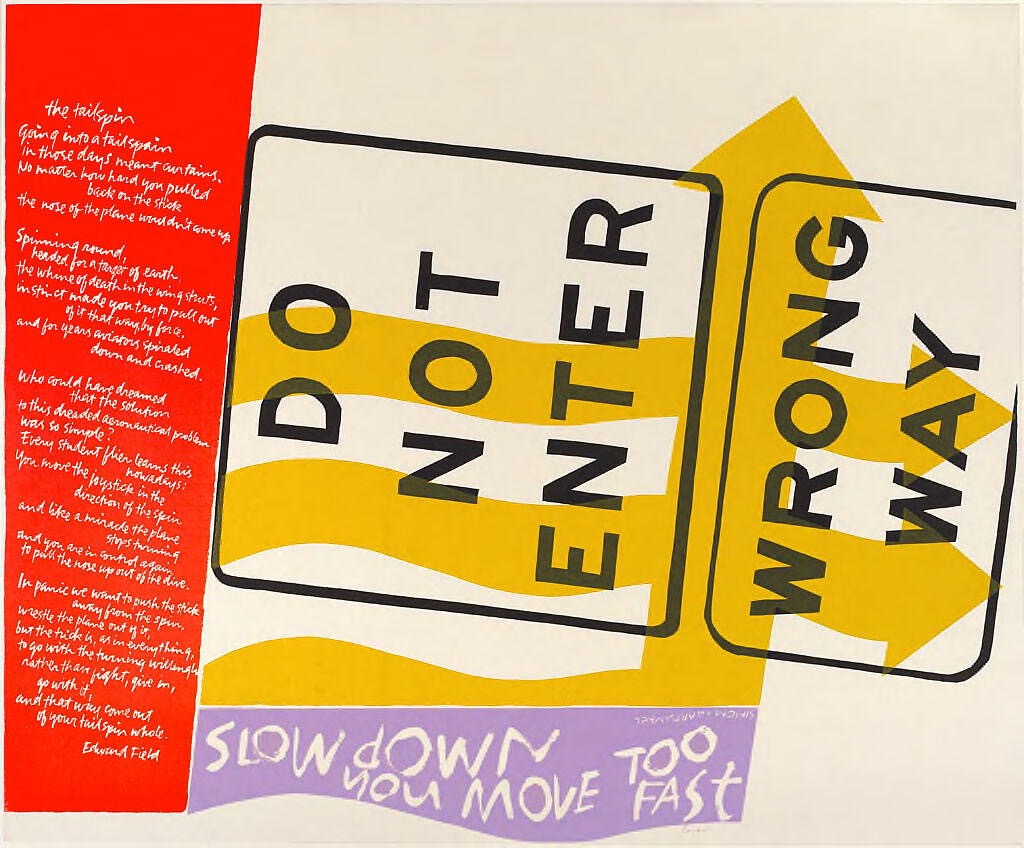
Corita Kent (Sister Mary Corita):
feelin' groovy [print] (1967)
Signed: l.r.: Corita
(not assigned): Printed text reads: DO NOT ENTER / WRONG WAY / The tailspin / Going into a tailspain in those days meant curtains. No matter how hard you pulled back on the stick the nose of the plane wouldn't come up. Spinning round, headed for a target of earth, the whine of death in the wing struts, instinct made you try to pull out of it that way, by force, and for years aviators spiraled down and crashed. Who could have dreamed that the solution to this dreaded aeronautical problem was so simple? Every student flier learns this nowadays: you move the joystick in the direction of the spin and like a miracle the plane stops turning and you are in control again to pull the nose up out of the dive. In panic we want to push the stick away from the spin, wrestle the plane out of it, but the trick is, as in everything, to go with the turning willingly, rather than fight, give in, go with it, and that way come out of your tailspin whole. Edward Field / SLOW DOWN YOU MOVE TOO FAST Simon + Garfunkel
"Most good work ends with something other than a bang …"
The concrete work Whimpered when it ended. There were no ticker-tape parades, no marching bands. No heavenly hosts singing through the firmament. It was almost a non-event. Three remaining crew members worked the walls to a smooth finish. All the pomp and circumstance involved in the BIG pour was absent. I set three cold beers into the ice chest and pointed the survivors in their direction. The next thing I knew, they were pulling away from the curb. Pablo, the concrete contractor, called a while later to say he'd return the following morning to see how the last coat dried. I told him I wanted a walk-around so we could appreciate the work before I wrote him a check. There are odds and ends to finish and a more thorough cleaning of the area, but Jesse, our structural contractor hired to prop up and level the porch roof, will make his mess, and he's next on the agenda; this ending only a way station on the way toward final completion weeks or months hence.
Sports competitions materially misrepresent how contests work.
RidingBus
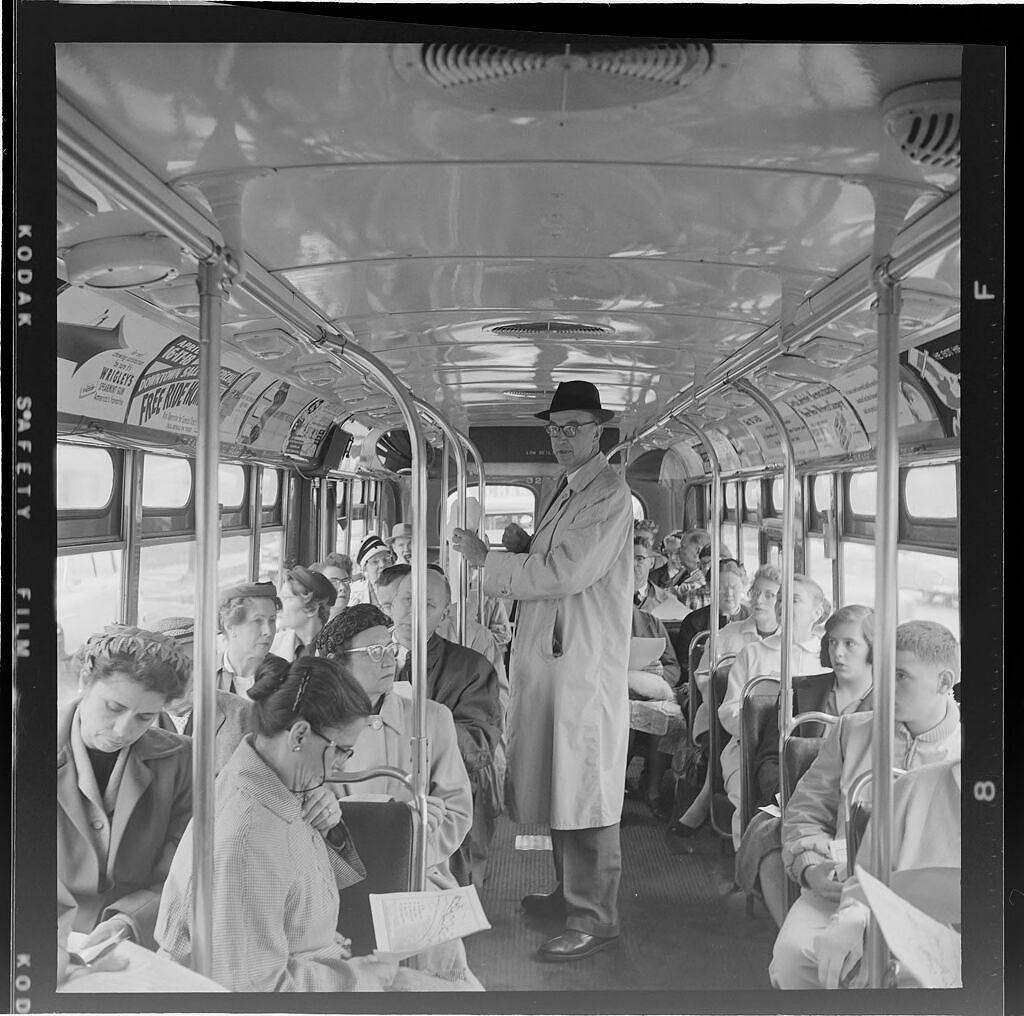
Jack Gould: Untitled [passengers on crowded city bus] (c. 1950)
" … prefer to wait on the corner for their next ride to anywhere."
The Grand Other enrolled in a new school this term, so her last year's school bus routine wouldn't get her there. She'd have to ride the city bus, something with which she had zero experience. Further, her older sister had filled her with stories about how rough the city bus could be, so she was understandably hesitant even to try that ride. Her mom and dad both went to work long before The Other would have to leave for school, so she was left with a dilemma. Fortunately, her grandfather is an enthusiastic bus rider, and seeing opportunities to engage in one of his favorite activities, he volunteered to introduce her to the lifestyle.
I consider RidingBus to be a lifestyle, a choice.
Anniverse

Izaak Jansz. de Wit, after Wybrand Hendriks:
Echtpaar in een boeren interieur
[Couple in a farmer's interior] (1794)
" … we continue forward somehow."
Some dates seem to attract events. My father and nephew were, for instance, born on the same day/month, January 15, and that became an annually celebrated anniversary greater than the simple sum of two birthdays. My first wife's younger sister was born on Norwegian Independence Day, Syttende Mai ("Seventeenth of May"), elevating that anniversary into a super holiday for that Norwegian family. What one says on such days tends to be the same, ever older stories, grown perhaps even more remarkable with each retelling. For the Muse and I, September 15th must undoubtedly be our most prominent anniversary. It's the day we met twenty-seven years ago, and it carries ever greater nostalgia and significance with each passing year. This year, additional significance attached itself to the day when The GrandOtter, The Muse's granddaughter Sara, gave birth to our first great-granddaughter, making us both great-grandparents.
Such significances always seem unlikely, though double occurrences cannot be described as rare.
ImperfectlyLegal
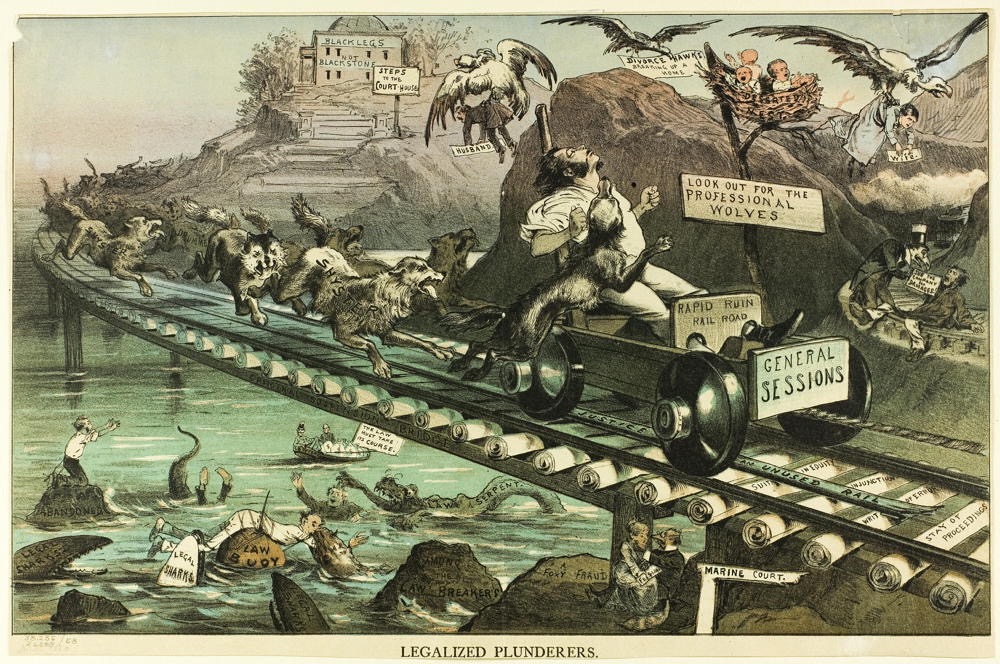
Unknown Artist: Legalized Plunderers, from Puck (1880)
" … fly coach with their constituients when on the people's business."
The Muse and I last night attended a neighboring county Democratic Party's annual celebration dinner featuring a visit from our spectacular United States Senator Maria Cantwell. A visit with her when she was visiting Walla Walla in June yielded The Muse a senatorial letter of intent for an important Port project and me an appreciative interest in my Blind Men and the Elephant Book. We attended the dinner in hopes of continuing the conversation we'd started and also to revel in what is turning out to be a genuine banner year in the history of our Democratic organizations. The dinner was held at a union hall, where we learned that Biden's term has resulted in a record number of apprenticeships and jobs. That county's economy's on fire!
We were seated at a table with a couple of former school teachers who retired from the Seattle suburbs and moved over into the less urban east of the Cascades.
Senses
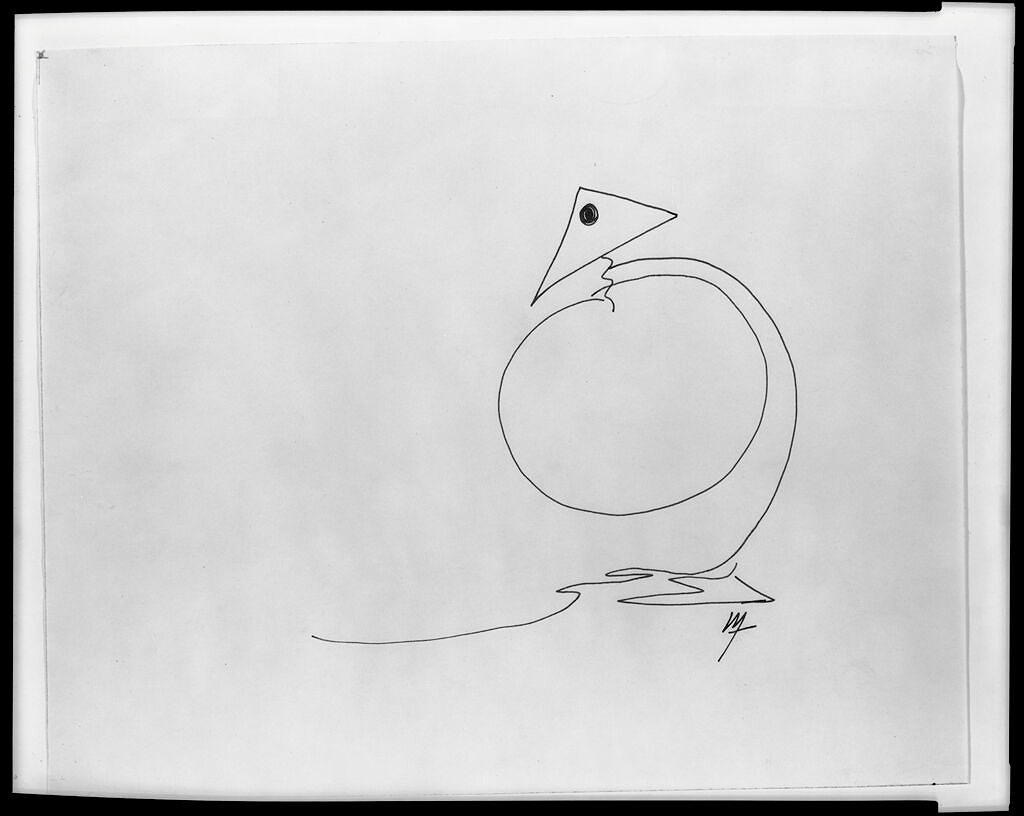
Margaret Fisher: With a Sense of Humor (20th century)
" … Presence isn't quite ready to make sense to us again."
I feel moved to consider Senses in this story. Not the usual sight, smell, taste, hear, and feel, but a parallel or even an orthogonal set familiar to everyone: Insense, Outsense, Absense, and Presense. I could throw in the sense of humor, too, and any others that might only come into focus once I start this consideration. I propose this plotline because The Muse and I experienced a shocking Absense over recent days, the sudden disappearance of a presence that had come to kind of define us. Loss seems ordinary enough. We slough off plenty in our regular day-to-day existence, and life itself depends upon death. Everything we consume except milk, honey, water, and air depends upon something dying for sustenance, so we're certainly not strangers to Absense.
The steelhead filet I carefully grilled over hot coals before dinner last night disappeared shortly after that, never to return.
Weekly Writing Summary For The Week Ending 9/12/2024

Preston Dickinson: Self-Portrait (c. 1926)
Qualifies As A Feeling?
I mostly feel lucky even though lucky probably doesn't fully qualify as a feeling. Further, luck must be utterly out of my control, or else it's not really luck because luck if it's governed by anything, must be ruled by randomness. One might harbor feelings about impending luckiness but only experience luck once it happens. How often do I "feel" lucky without experiencing an actual manifestation of luck? How frequently do I experience luck without having a premonition of its arrival? Both questions seem as unnecessary as they are unanswerable. I might cringe when Friday the Thirteenth comes around, regardless of which day of the week it lands on that month (Thanks, Walt Kelly!), but I cower for nothing more or less than randomness. Not to downplay randomness, for it was probably the force that resulted in us. It routinely produces unlikely results if only because we cannot calculate the likelihood for most results. We might be equally blessed and cursed by randomness, just as lucky or unlucky as we expect to be, depending primarily upon our expectations, which are rarely random and most often focused on feeling luck as if luck even qualifies as a feeling.
GoodMeasure
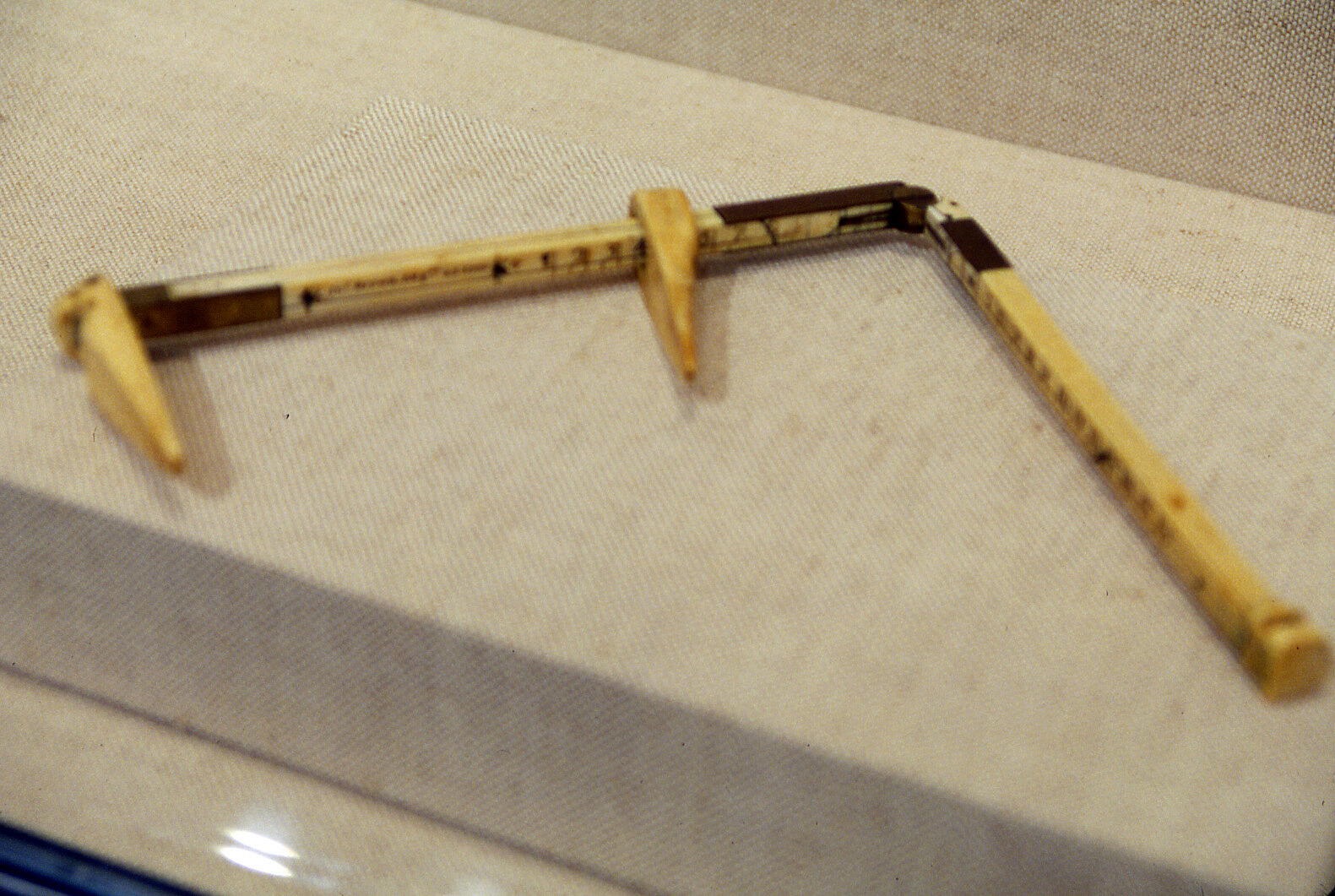
Unknown Artist:
Ivory and Brass Folding Shoe Measure (1738)
" … I feel deeply sorry for that absence."
I recently happened upon a Neil DeGrasse Tyson video where he explained how, in high school, he acquired his first calculus textbook. He admitted that he initially felt utterly intimidated by the gibberish he found inside. He explained that the jump from algebra to calculus is greater than from arithmetic to algebra. Even so, as weeks went by, he came to catch himself understanding ever more of the previous gibberish so that within that quarter, he'd come to rely upon those previously baffling formulas. This seems the typical testimony of anybody's mastery. It tends to grow upon them slowly, perhaps eventually leading to a flash of realization. Not everyone finds mastery, though, and those who don't often remain baffled about why they couldn't experience that shift.
I was making small talk when driving The Grand Other to school yesterday.
Revealed

Unidentified Artist
[after Rembrandt Harmensz. van Rijn]:
The Blind Fiddler
-Alternate Title: Blind Fiddler, Led by His Dog
(1631)
" … all will shortly be Revealed."
And so it came to pass that after a weekend drying in the late summer heat, the new concrete porch portal watched the crew return to remove its forms. Screws whirred out, and pry bars separated painstakingly-prepared form faces, oiled chamfer strips and insets intact. Over a scant couple of hours, the place had a new face, one that was in no way familiar. By morning's end, after all those boards had been loaded into a trailer, the yard was bare for the first time in almost a month, and our new home stood before us. The concrete was darker than it would seem by week's end, as Pablo, our concrete contractor, explained. The finishing had already begun. Each edge would be sanded or ground, imperfections filled with a putty-like substance, then sanded or ground again. They will repeat this process until no blemishes remain. It's painstaking work again, back-breaking in its own way, requiring delicacy this time rather than brawn.
The new face seems massive.
Lap-Sitting

Lucian and Mary Brown:
Untitled [boy sitting in woman's lap] (c. 1950)
" … just run-of-the-mill reassurance."
I have proudly possessed a string of Lap-Sitting cats. My current one, Max, finds me most mornings, drowsy and tentative, sitting and staring out the library window. He tries to hop up stealthily, but that's generally beyond his ability. He tromps around the place in those pre-dawn hours. I can hear him coming from clear across the house, for his are no mere little cat's feet. He most often enters from the upstairs window, landing at the end of the hallway with a definite thump before proceeding down the hall to the stairs, which he makes ring with each step, down into the entry hall before turning through the dining room and into the living room where he finally fails to sneak up behind me. He can still surprise me with his timing, though. He suddenly appears on the chair arm, sometimes managing to get tangled up with my arm, whereby he aborts the attempt. He'll sometimes slink away then and not return, but he often mounts a second try, landing off balance in the vicinity of my lap. He often requires a little nudge and some guidance to find a comfortable position before settling in for some serious Lap-Sitting.
I adjust my schedule for these visits, which usually seem far too brief.
Greatness

Edward Ruscha:
Angry Because It's Plaster, Not Milk (1965)
©Edward Ruscha, Fair Use
"Thank you for your patience."
My Greatness must have evolved in me, for I was not born Great or, indeed, born to Greatness. I believe that something, not Greatness, was, however, inborn in me that helped me achieve what nobody who knew me then would have foreseen as my emerging Greatness. The preconditions must have been there, however unnoticed, because leopards never change their spots. Nobody knows how leopards first acquired their spots, only that once possessed, they're never lost. I suspect that Greatness carries a similar distinction because it knows no comeuppance. Once emerged, it's present. Once noticed, it's no longer tacit. It becomes the defining attribute of anyone who owns it, though some insist that Greatness owns its incumbents. Either way, I say it's Great to experience Greatness. Those who have never experienced their own Greatness couldn't possibly understand. Whatever Greatness anyone who's not Great ever notices isn't even distantly related to what that one with genuine Greatness experiences. I'm shocked when anyone even mentions my Greatness, for how could they possibly know of what they speak? True Greatness comes through suggestion: the great must introduce themselves to the unwashed. Some insist that Greatness is exclusively a function of auto-suggestion, though I strenuously disagree, as would anybody possessing the Greatness pedigree.
I'm impressed with how language evolves out from under even its strictest adherents.
Assembling
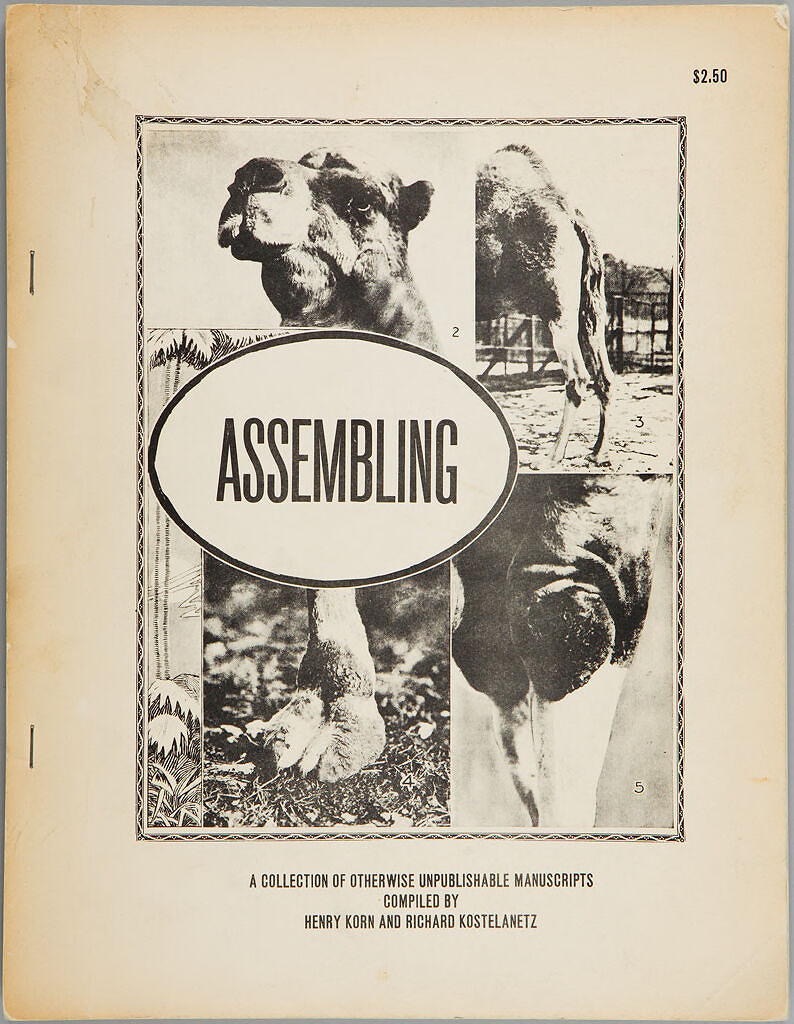
Edward Ruscha: Chocolate
[Series/Book Title: Assembling, vol. 1,
Henry Korn and Richard Kostelanetz, compilers
Brooklyn: Gnilbmessa inc. (1970)
" … genuinely qualifies as work worthy of shirking."
The final fortnight of each quarter, my thoughts turn to Assembling. If disciplined in my writing that quarter, I will have completed ninety stories, each written under the presumed aegis of that quarter's theme or stated purpose. This quarter, I've been writing Grace stories, though not every piece necessarily seems on topic. If I squint, I can see how I interpret each piece to have fully satisfied its theme, though I seem like an over-insistent assistant district attorney prosecuting my case. Assembling involves bringing each story together in one place so that it might appear to be a manuscript where I can number pages and list chapters in a Table of Contents. The manuscript amounts to the least helpful form for every purpose except one, that of publishing.
Given that I have not published any of the stories I've been creating over the last twenty-nine quarters, I've primarily considered Assembling an optional activity.
Porchy
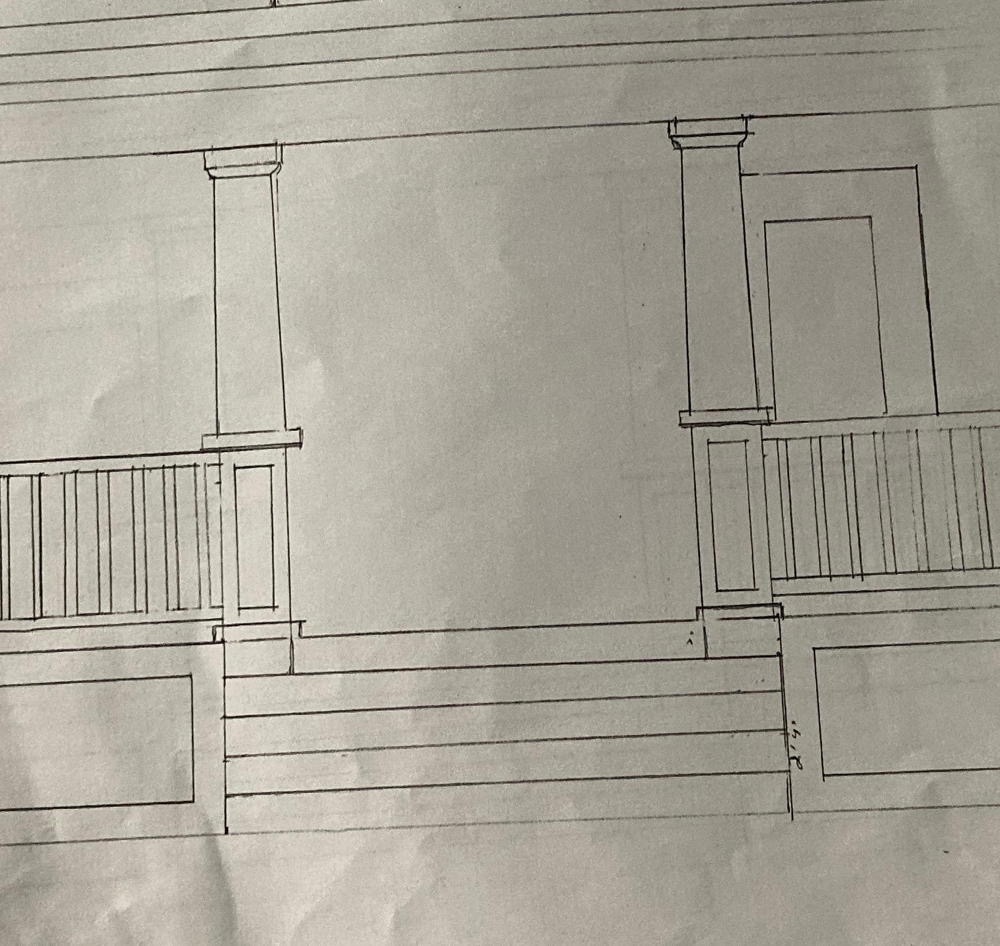
The Muse's rendering of our finished porch remodel.
"Those without the patience of Job experience the amateur's impatience …"
When creating something, the creator must somehow tolerate a lengthy period where that something does not yet even distantly resemble the end product. The difference between amateur and artisan might be measured in the distance between their patience. Impatience seems the constant companion of the amateur and forbearance, the artisan's eventual nature. The patron's left wondering if their investment will ever pay off. Pablo, our concrete contractor, aspires to be the artisan he only occasionally is yet, though he's coming along. Yes, he did get a little ahead of himself when pouring that first footing and failing the following four inspections. His comeuppance tried everyone's patience, especially his. We ended up with a footing so over-engineered that it will still be here through centuries hence. Whoever tries to turn The Villa into a teardown will curse our existence.
Preparation for the Big Pour consumed more than a week, with constructing forms and fitting them with wooden strips to produce insets and beveled corners.
Weekly Writing Summary For The Week Ending 9/05/2024
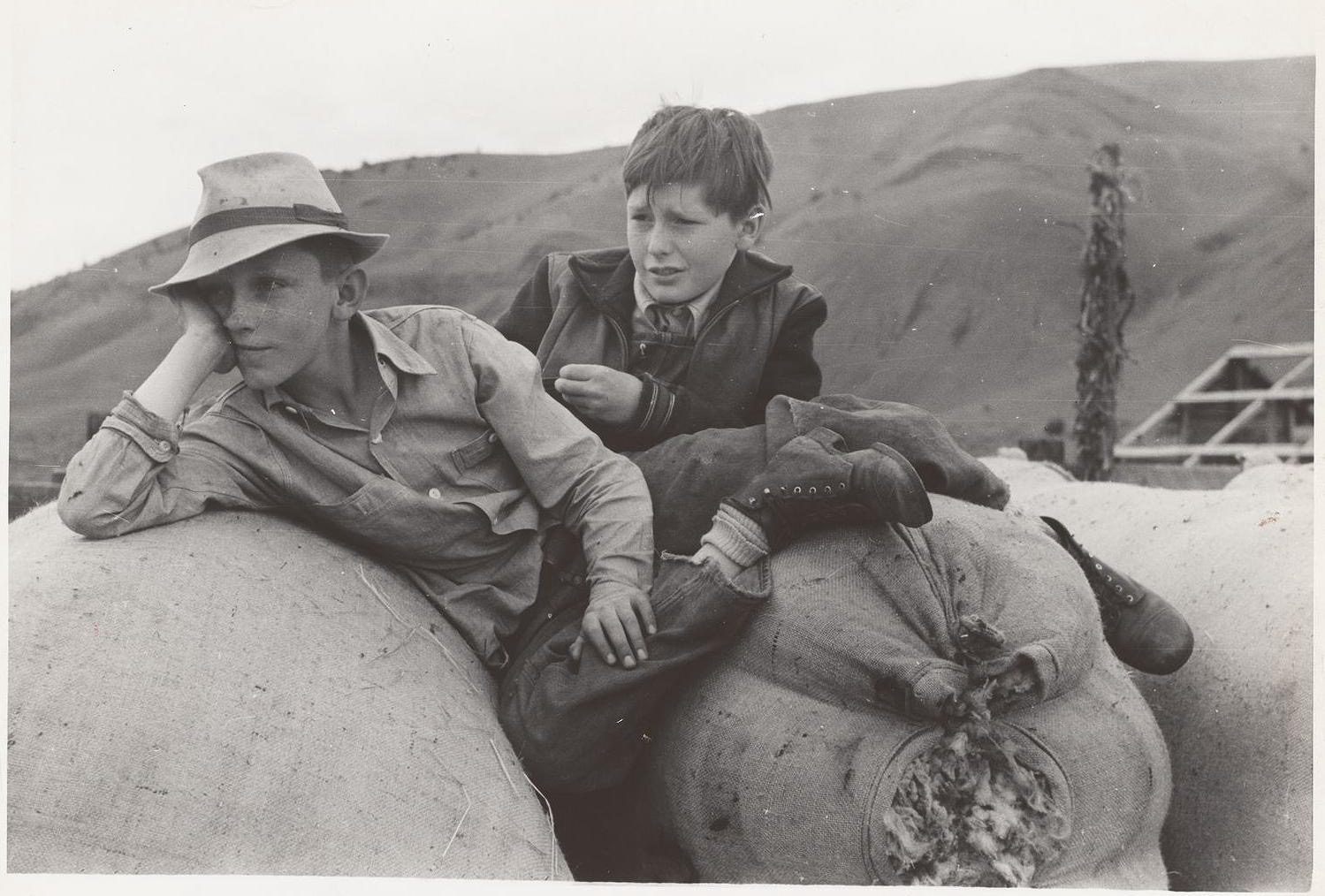
Russell Lee:
Boys on sacks of wool, Malheur County, Oregon (1941)
United States. Farm Security Administration
Almost Exclusively In The Dark
The dust turns to talcum powder as August becomes September. School starts, and I volunteer to show The Grand Other how to ride the bus, but the bus route closed down due to road construction work. I drove her to school, reveling in the opportunity to influence her. I feel compelled to offer her the benefit of my experience, even though she doesn't seem to appreciate my attempts. I know my influence won't be immediate, though it might prove insidious. Grandparents are widely recognized for their insidious nature. We plant seeds we know we'll not see flower; our indifference remains our probable superpower. Few things cannot be improved by the judicious application of sincere indifference, and I can see and raise any indifferent move our granddaughter might attempt. She suffers from the certainty that she can see right through me, but I am not nearly as transparent as I probably appear to her. I'm dense and defensive from a longer lifetime of engaging. I can't quite remember the certainty of my youth, but I considered it considerable then. I earned my comeuppances, and while I'd hope The Other might benefit from them, I understand the rules of this game preclude her directly learning anything from me. That's why I go subversive. She cannot see and might never perceive, though the possibility will always remain. Decades from now, one of my odd comments might finally find its mark. Like everybody, I live almost exclusively in the dark.
Approximately
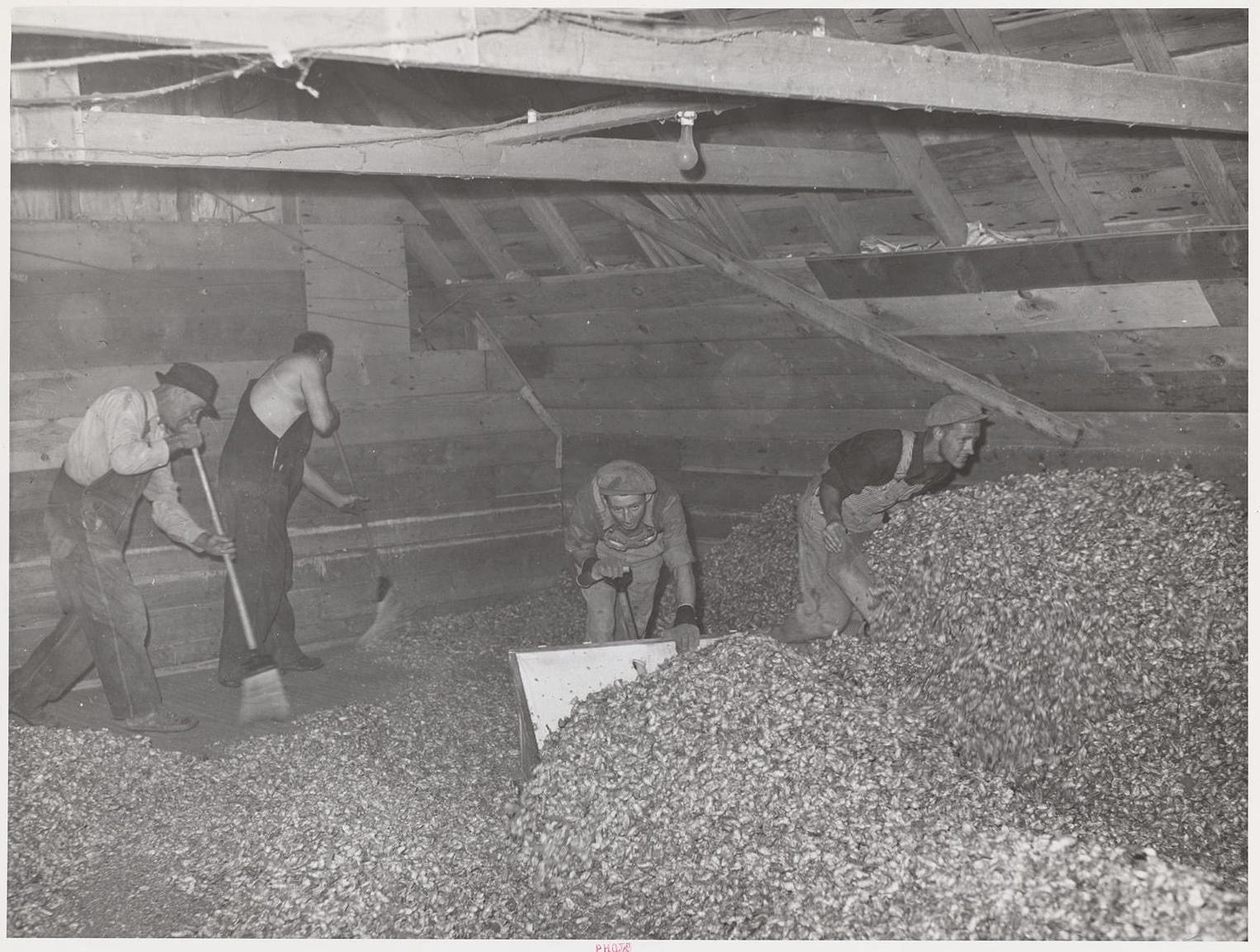
Russell Lee:
Scooping and sweeping dried hops
from drying room to adjacent room
where they will be baled.
Yakima County, Washington.
There is approximately twenty-five percent
dryout of hops (1941)
United States. Farm Security Administration
"You guys figure out the exact measurements between you."
I am an Approximately person. I do not deal in preciselies. I broadly estimate impacts and generally thrive. I do not appear to have the sort of mind that derives details. I see impressionistically. To my mind, Renoir and Monet painted with photographic clarity. Details lose me. I take measurements to immediately forget them. When Pablo, Our Concrete Contractor, asks my opinion, I refer him to Jesse, our Structural Guy, or Joel, Our Carpenter, for I cannot seem to retain a memory of exactly what we decided when we discussed design. How high the supporting wall should be poured does not reside in my head. I might notice when a disagreement emerges, but I will not be the one resolving the question. For that, we need to convene a conversation. I called Jesse and Joel after it seemed Pablo was measuring from the wrong surface. I could neither confirm nor deny a problem. I held suspicions. I'd also insisted that Pablo call Jesse and Joel. I was trying to encourage some conversation. Why is it so hard for people to talk with each other?
It would have been an excellent idea for us to detail the design of our front porch refurbishing before we started demolishing its past.
FiveHundredMiles
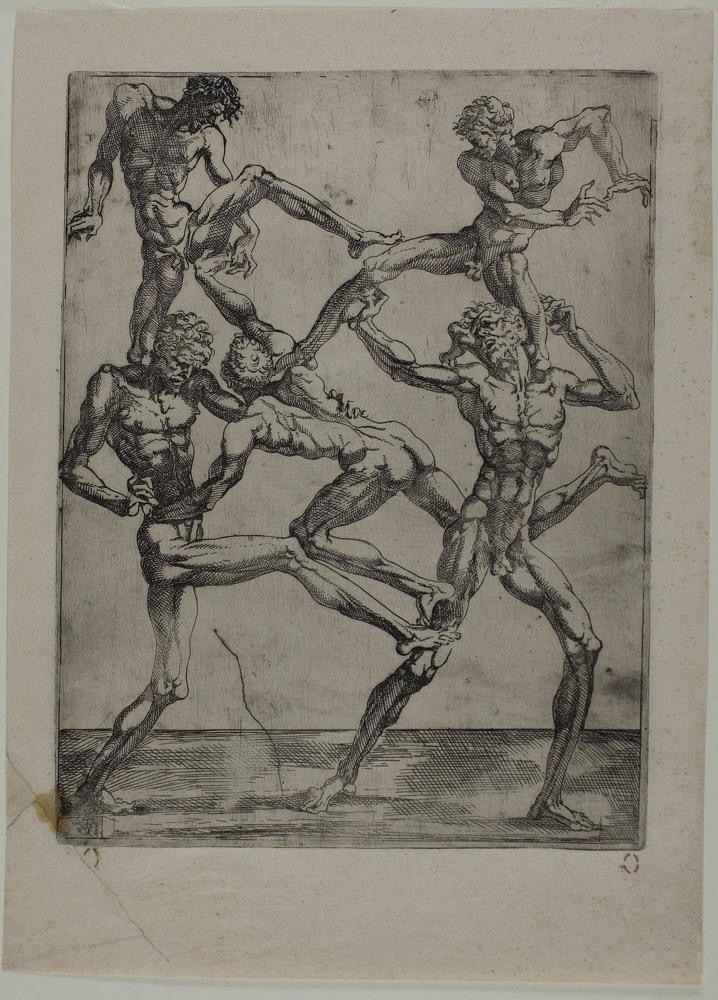
Juste de Juste: Pyramid of Five Men (c. 1543)
" … closed on Tuesdays forever."
My pioneer forebears would have counted themselves uncommonly fortunate had they been able to make twenty miles a day for a month. That would have gained them about what I drove yesterday in just eight hours. FiveHundredMiles seems like a vast distance. We rarely drive more than three hundred miles in a day, and even then, we feel the miles when we arrive. But I needed to run a couple of errands in Portland, and the schedule suggested I might spare no more than a day, so I decided to try. I'd initially figured I'd drive alone since The Muse's schedule's more crowded than mine, but the night before, she sheepishly asked if she might tag along. When I assented, she quickly cleared her schedule. "You'll have to be ready to go by seven," I cautioned. Over and back in a day works best when accomplished in daylight.
We got away by eight.
Helpless

Elihu Vedder: Fisherman and Mermaid (1888-1889)
" … I prefer to do my own ironing."
I am, like all males, Helpless in many ways. All men avoid developing certain skills for a wide variety of reasons. I, for instance, cannot dust. I tell The Muse it's because my failing eyesight cannot discern dust from whatever it’s covering, but since my cataract surgeries left me with nearly 20/20 vision, that reason lacks believability. I still stick by it, dusting being, by personal affirmation, beyond my calling. Nor do I sew, although tailors are often males. My mother was a very talented seamstress, so I probably inherited the genes, and The Muse likewise sews like a pro, so I don't lack a qualified mentor. Yet, I'm sure that sewing remains far beyond my skill set. I am also nobody's auto mechanic or technical support. Anything with many moving parts requiring a precision hand lands outside my skills, abilities, and experiences, or so I insist.
I probably drew my competence lines for reasons other than my lack of fine motor skills.
Fairing

Johann Theodor de Bry:
Little Village Fair (16th-17th century)
"The less than generous sociologist in me steadfastly refuses to see the resemblance."
Last week was Fair Week in the Valley They Liked So Well They Named It Twice. The Southeastern Washington Fair and Rodeo has been an annual event since the eighteen-sixties. It was a highlight of every one of my summers growing up, occurring just when the new school year was starting. We'd begin the school year the Wednesday before Labor Day, then take the following Friday and Monday off. No better way to start a new school year than with a four-day weekend! That Friday would be Kids' Day, and we would flood the fairgrounds to ride the rides, eat the food, and win goldfish that were inconvenient to transport home. We'd wear Rosellini for Governor buttons and dutifully tromp through animal barns and pavilion displays. In its day, the Fair seemed a pretty perfect portrait of our small city's personality, from the Saturday morning parade to the parimutuel horse racing.
The Fair seems less grand now.
F_J_B

H. R. H.: Pen Pictures of the Leading Events of the Last Week, from Chicago Tribune
(Published Feb 26, 1893)
" … they are not incorrect."
I solo worked our candidate's booth at the fair, casting for and reeling in potential voters. I'd learned the technique watching The Muse last year when she was running for the position of Port Commissioner, an election she went on to win. The Muse is a naturally gifted retail politician, which means she can attract attention and gain support. Not every candidate comfortably projects themself onto others, and not every potential voter necessarily appreciates a candidate reeling them in. She'd ask innocuously: "Are you a voter here?" The answer winnowed out the many out-of-town visitors to our fair. Anyone answering was hooked. Many remained oblivious, almost invisible, as they moved through the crowd. She could usually tell if someone was conservative because they'd turn their head a quarter turn away, deliberately not seeing her there, casting into the crowd. They'd become deaf, too, suddenly unable to hear her question.
Those who responded could be reeled in with a follow-on question, and some would soon find themselves engaged in good-hearted conversation.
Jobsite
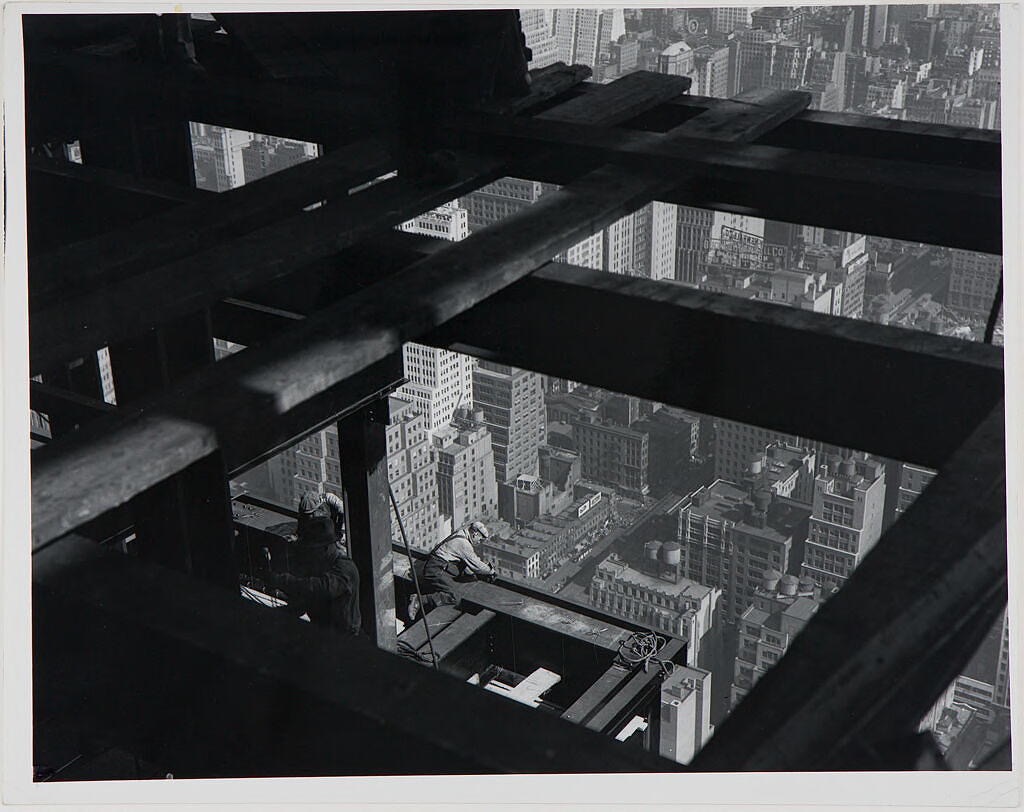
Lewis Wickes Hine: Construction--Empire State Building, (1930-1931, printed later)
" … we will sorely miss this sacred inconvenience."
A home becomes a jobsite quickly, without very much fanfare. One minute, I was breakfasting on my front porch, and the next, or at most the moment after, that porch was being roughly disassembled. I double-locked the front door to prevent anyone, me included, from inadvertently stepping out into air improved only by naked joists. The idea that such a thing could happen haunted me every time I passed by that door through the first weeks. The view out the bottom-of-the-stairs window became a peek into the progress of the deconstruction and the following rebuilding. I stepped around construction materials to set sprinklers and tried to remember to move the vehicles before the work crew blocked the driveway every morning. The whole rhythm of my life changed.
A work crew seems the rough equivalent of a haunting.
Weekly Writing Summary For The Week Ending 8/29/2024
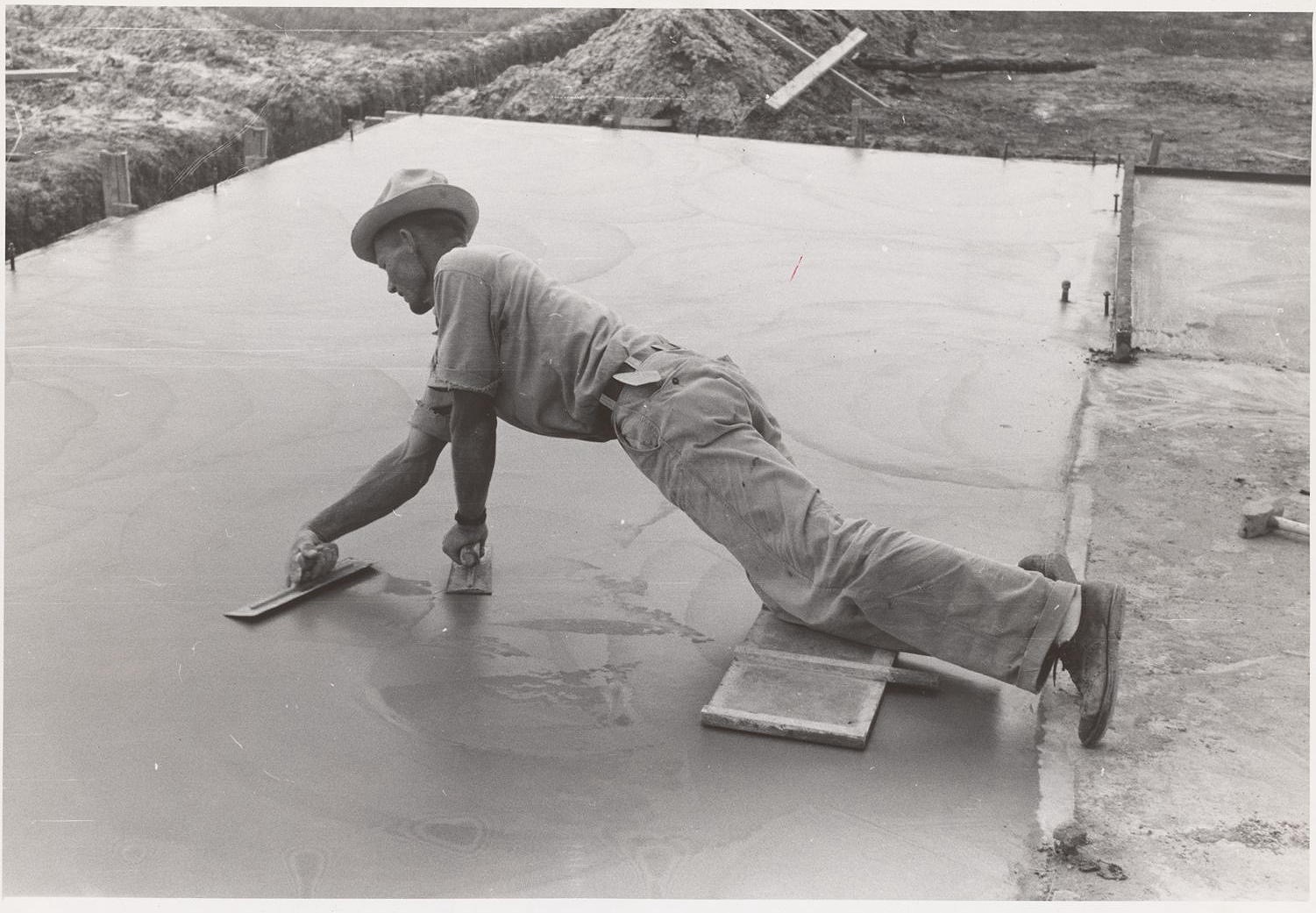
Russell Lee:
Smoothing concrete floor at migrant camp
under construction at Sinton, Texas (1939)
United States. Farm Security Administration
Pride As Well As Purpose
This writing week might have served as a reminder of the necessity of deliberately choosing the terms and conditions I'm pursuing. I can default to a mindset believing I'm somehow destined to succeed, but neither success nor failure usually operates so inadvertently. Deliberate choice might not guarantee a damned thing in this world other than clarity of purpose, though satisfying purpose cannot usually be guaranteed. Clarity helps identify failures more often than it ever guarantees success, and while clarity of purpose might best guarantee disappointment, that clarity remains important. For instance, a fresh choice can feel renewing when overrunning original purpose, even in the light of certain impending failure. One dream ending into an alternate beginning might make a meaningful difference. I'm usually tempted to ride a losing horse until a little after losing the original contest, when I could have switched horses well before losing the race, and I can almost always project that I'll lose. It might even be possible to feel pretty damned successful without ever once even finishing any individual contest, taking pride as well as purpose switching horses.
ThePour
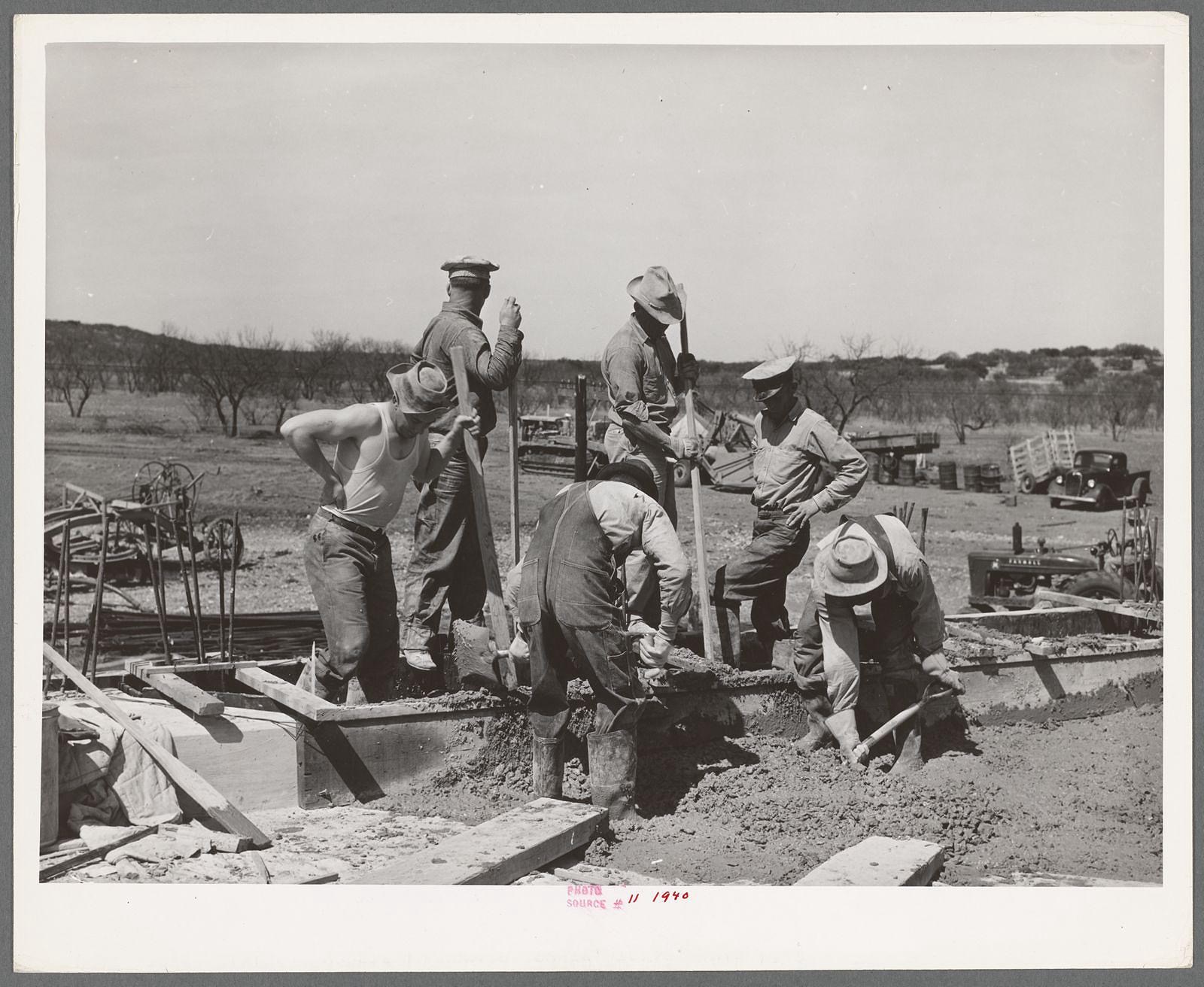
Russell Lee:
Road worker mixing concrete in Menard County, Texas (1940)
United States. Farm Security Administration
"I swear I'm just along for the ride."
Ten days later, we might have recovered our porch refurbishing project. A bungled footing pour had set the effort back by requiring some remedial reengineering and considerable additional digging. Four failed inspections, and the inspector still needed to clear for ThePour, which had sometimes seemed like a mythical, perhaps unattainable future objective. The morning of ThePour, we still had yet to receive the requisite permission. I stopped by the job site to chew Pablo, our concrete contractor, a "new one," telling him to stop fucking me and do his job. "We will pass this morning's inspection," I insisted more confidently than I should have. He started explaining to me that one footing might not yet have been dug deep enough, that he might have to jackhammer out the sidewalk and dig from the top down rather than from the side in. "Fine," I replied, "Whatever it takes."
I left it at that, leaving to take our GrandOther to school, promising to return in an hour.
ComingToFuckingJesus

Franz Stuck: The Guardian of Paradise (1889)
"I might convene my ComingToFuckingJesus Meeting,
but nobody even remotely resembling Jesus ever attends."
I am, by nature, a patient man. I am taken to making generous interpretations. I think of myself as forgiving to a fault. I travel without the burden of grudges. I have never been obsessed with the presence of even imagined enemies. I am, in short, usually happily oblivious. Go ahead, take mean advantage of me. I'm unlikely to seek redress in the thoroughly unlikely event that I notice. I am a well-known and long-standing schlemiel, born to be humiliated. But even I have my limit. I rarely experience it, but somebody will likely hear about it when it finally appears. I'm likely to convene what I call a ComeToFuckingJesus Meeting to air my ill feelings. I will expect contrition and compliance from the target of my considerable vehemence. I will come pissed and usually surprise myself with the swiftness of my truly terrible sword.
I am not now, if I ever was, a Christian.
Successable
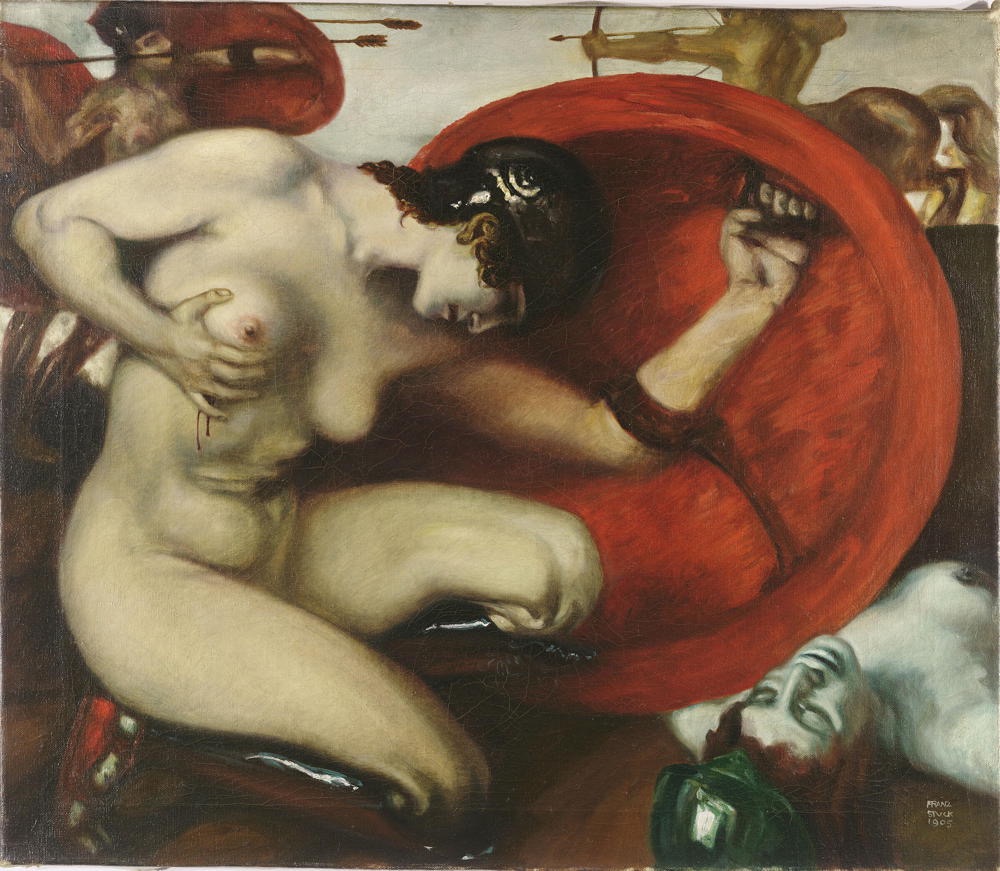
Franz von Stuck: Verwundete Amazone [Wounded Amazon] (1905)
" … if only we were clever enough to insist upon those more infinite terms of engagement."
Success has ten thousand identities, from the simplest-minded to the sublime. The simplest-minded achievements are those where some winner takes all, where a student earns straight As, and the quarterhorse takes the crown. The more nuanced successes are more common, ones where criteria seem ambiguous and some higher-order judgment appears to be required to even coherently aspire. A mentor of mine reminded me to begin every critique by appreciating that something even appeared on the page, for that alone might qualify as a miracle. Few experiences can be appropriately characterized as total losses; even last place still finishes a race. A firm belief in the possibility of absolute success was never required to enter a race. Once the odds turn against a competitor, it rarely makes much sense to insist upon belief in an unlikely ultimate victory. Choose your success criteria carefully.
It matters which game you're playing.
ReInspecting
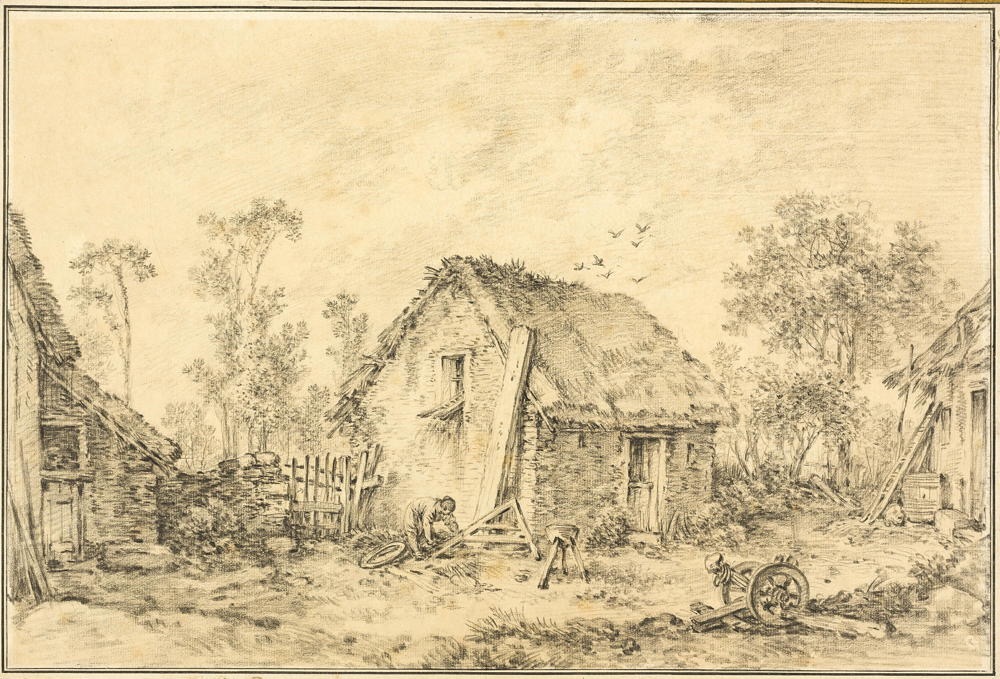
François Boucher:
Landscape with Rustic Cottage (c. 1760)
" … an essence of ProjectCommunity."
Failing that first inspection threw our porch remodeling project into some chaos. We started insisting upon dotting 'i's and crossing 't's, which affected momentum. Our concrete contractors found another project to entertain them while waiting for the city to mark where utility lines lay. A couple of days later, we decided that since they would be digging with shovels rather than backhoes, we would be unlikely to get into trouble if we just went ahead and started digging around the offending footings. You might remember that the inspector found the footings too shallow and that the engineer had prescribed simply digging deeper beneath the four load-bearing points along the footing. The crew quickly dug the prescribed depth and dimensions on three of the four load-bearing points. I ordered a second inspection before they'd finished the fourth point, which looked to be a more difficult dig. The inspector appeared at the appointed hour, though the contractors didn't.
It was clear that the work was not yet complete.
Reunion

Louis Monza: Corn Eaters Reunion (1940s)
"Life would be tragic if it weren't so goddamned beautiful sometimes!"
She insisted that she would not attend, that the experience would prove too painful to bear. She had helped organize the last reunion. She had participated but with a role to play, a role she could hide behind. She had been charged with taking pictures, and she'd successfully hidden behind her camera so she could witness without engaging. She felt too vulnerable and exposed this time, so she wouldn't go.
Then she told the most remarkable story.
Weekly Writing Summary For The Week Ending 8/22/2024
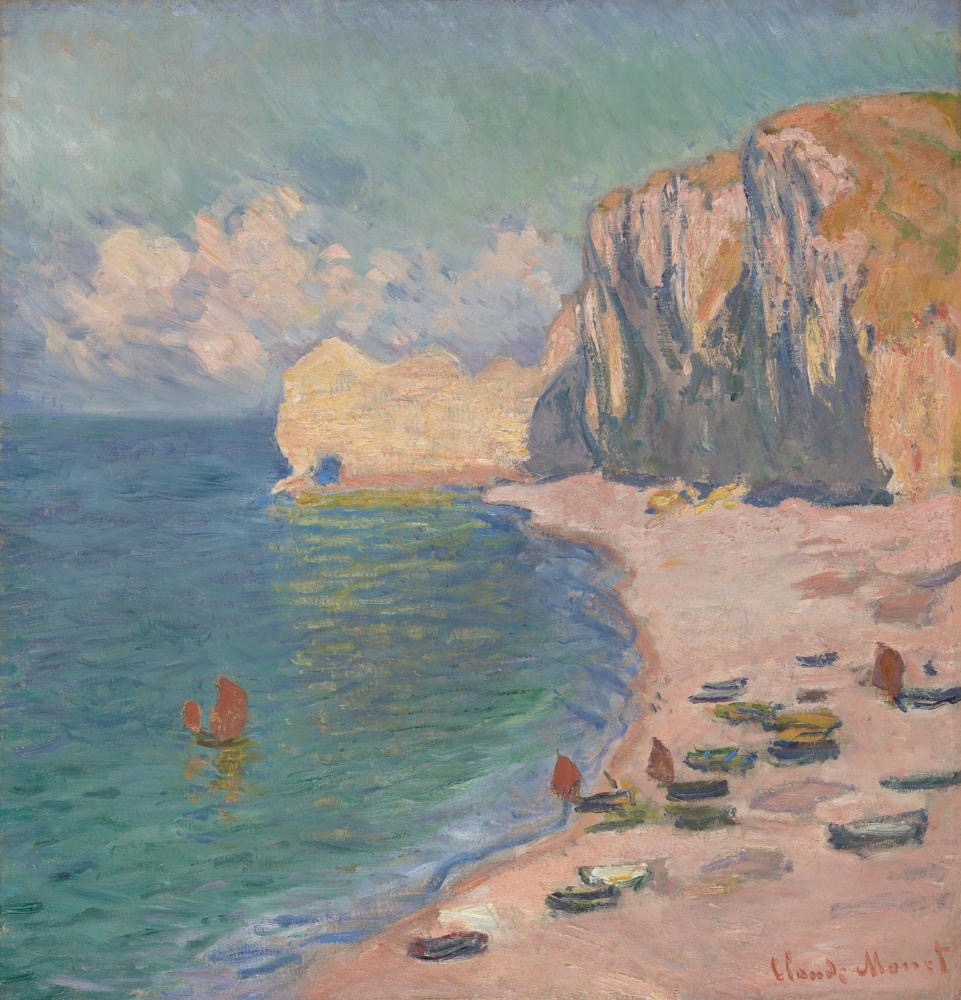
Claude Monet: Étretat: The Beach and the Falaise d’Amont (1885)
Nothing Else To Find
I might be the most fortunate SOB in this universe. Even so, not everything in my life goes according to plan. Heck, only some things I do seem necessarily planable, but I abide. I have been aging every inch of my way, though aging, being almost imperceptible from day to day, never seems prominent. I take stock each year as Summer starts waning and my birthday reappears. The Muse's birthday follows a few days later, and in the course of a week, we've successfully recalibrated. I nap more than I used to. I hesitate more before writing. When I started this writing streak seven years ago, I seemed fearless, though cluelessness more likely explains my behavior.
I worry whether my writing will prove up to standard, a standard I have yet to define or enforce. I do not want to live on purpose but on something more like an accident. I want what I create to remain mysterious, if not necessarily to my readers. I prefer to believe it's an expression more than a creation; creations need too much deliberation and design before beginning. I cannot command that I be spontaneous, for that command co-opts what spontaneity requires. I might live accidentally on purpose, the purpose an emergent property of engagement. It must not be all that important that I know beforehand what I'll create, but more necessary that I discover something I can relate to when creating or just after. I still do not know how to write, though I'm coming to understand when to write. I might have nothing else to find if I can muster the foolhardiness to write when it's time.
Flipped
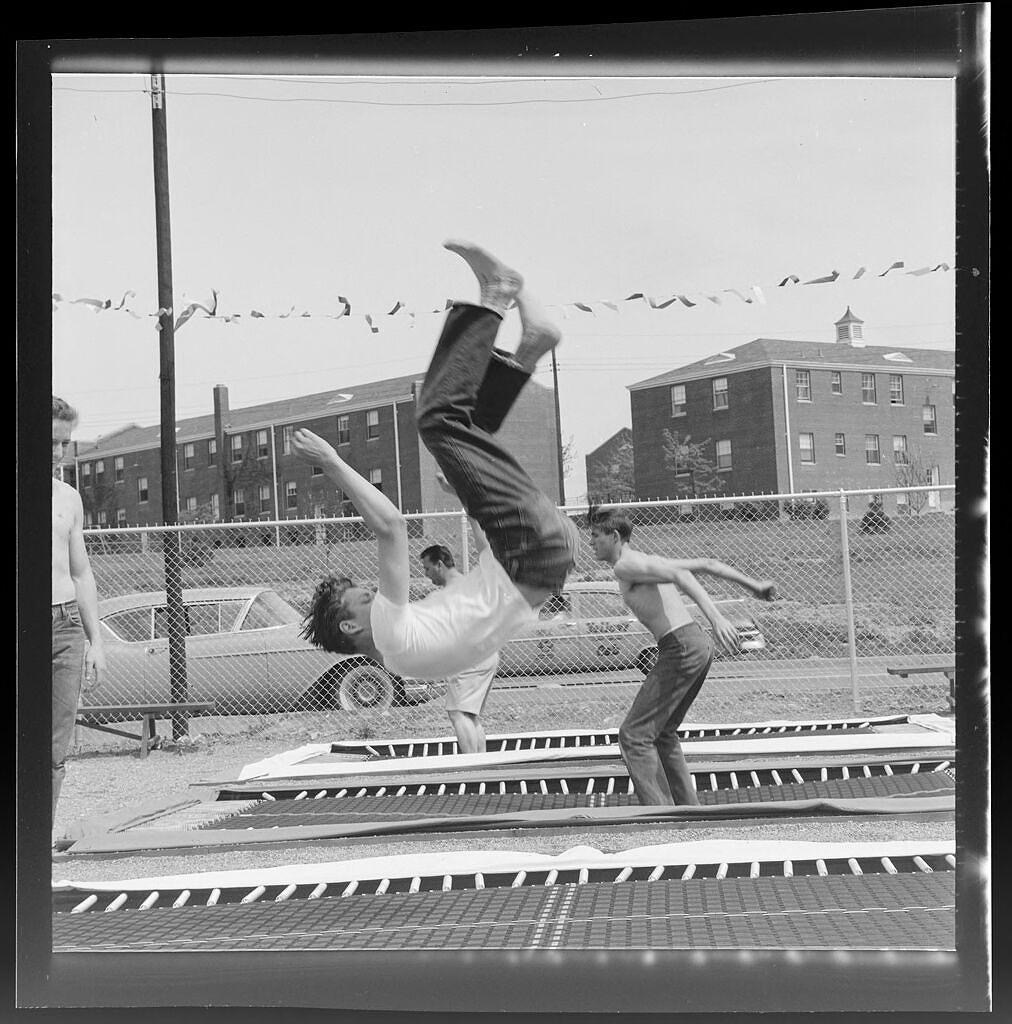
Jack Gould: Untitled [boy doing backflip on trampoline] (c. 1950)
"Weird seems to be the word of the moment."
Early yesterday morning or the morning before, I Googled "Jamie Raskin Speech At DNC" to find Representative Raskin's Banana Republican speech, which I'd seen mentioned in a New York Times piece. I'm a huge Raskin fan. We lived just around the corner from him when we were exiled to The People's Republic of Takoma Park in Maryland, and I appreciate his wisdom and wit. We also share the tragedy of losing a child filled with promise for our future. Having survived two bouts with Cancer, he seems exceptionally courageous and purposeful, the soul of effective opposition to the Banana Republicans. He also stood as a manager of the House's January 6 hearings. He chose the right side of history when making it. Google delivered the link, and I clicked on it, whereupon the Google Gods selected an appropriate advertisement as a preface, for, if anything, the algorithm is known for its prescient context sensitivity.
It served up one of those rambling, incoherent Trump ads featuring the chief Banana Republican failing to make either a case or a point.
GiftsDiffering
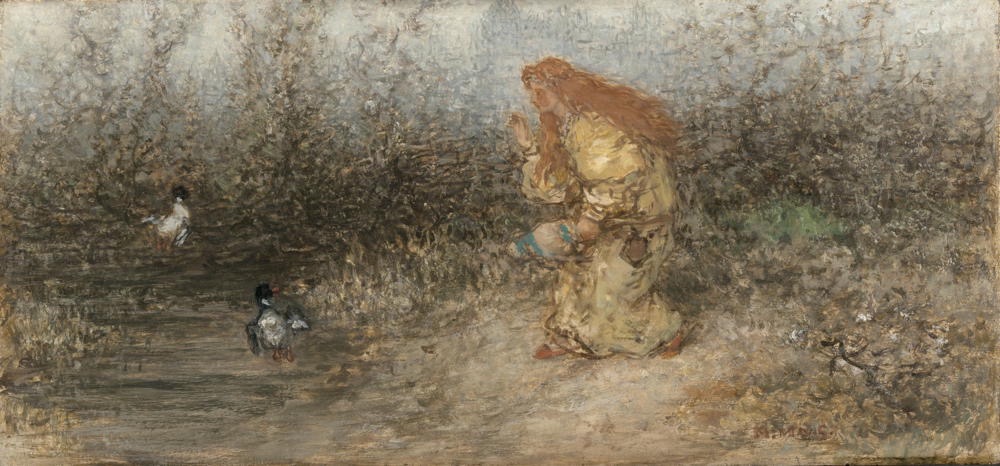
Matthijs Maris: Fairytale ( c. 1877)
" … surprise and perhaps even delight us in the end."
Gifts Differing: Understanding Personality Type, a 1980 book written by Isabel Briggs Myers, introduced me to the study of different gifts people bring to their lives and their work. Before I read this book, I naively presumed that my behavior represented normal responses while everyone else's was some variant of weird. I was not wrong in these early assessments; I was just a little incomplete, for coming to know my perspective just began my understanding. My perspective remains my base understanding, for how could it be otherwise? I have never experienced anything from another's perspective, and nobody else has ever shared mine. I remain unique but not necessarily typical, just like everybody. We remain steadfastly different but not unclassifiable. We each tend toward some common differences; those of us more comfortable with introverting are often more alike than we seem when compared with those preferring extroversion. If one does not get too awfully tangled up in their perspective, one might come to perceive others simply being themselves: perhaps weird but not necessarily wrong: different.
The few people populating our porch refurbishment project couldn't be more different.
Sacraments

Carla Liss, Designed by George Maciunas,
Published by Fluxus: Sacrament Fluxkit (early 1970s)
" … enough to fully satisfy our legacy …"
On my birthday or thereabouts, The Muse and I escape whatever life we're living to engage in an annual ritual as sacred as Christmas. We flee to the edge of the backcountry, on the border of the Winaha/Tucannon Wilderness, to partake of an indigenous fruit, the Winaha Currant. We accidentally discovered them decades ago when on an otherwise routine mountain toodle. We found bushes leaden with clusters of lush black fruit emitting an overwhelmingly alluring scent and tasting quite extraordinary. We hesitantly waded into the adjacent chilling stream and commenced to harvest the fruit, punctuating our work with greedy, lip-staining nibbles of our prey. We returned that first day with a couple of plastic bags of fruit, enough to produce some reduction for use in the kitchen: an unusual drizzle over meat or dessert: Sweet but perfumy, Savory, and absolutely unique. These were not quite the generic black currents popular throughout Europe but a New World variant as unique as our region.
We found that first foray into Current-gathering more than refreshing.
Redemption

John Singer Sargent: Death and Victory (1922)
" … the forgivable sin of project work."
Last week ended in deep disappointment. The porch refurbishment project had become an embarrassment. I sent the concrete crew home or off to another job pending a reply from the consulting engineer. I remember cursing the stipulation that this job needed an engineering report, clear evidence of needless regulation, and another thousand dollars spent to dubious effect. I'm learning that every resource this effort has attracted has been a critical puzzle piece, their importance sometimes puzzling until some moment of extremes. We'd failed our inspection—well, actually, the footing poured by Pablo, the concrete contractor, and his crew had fallen short of expectations. It's interesting how I included myself when ascribing guilt. I wanted no blaming or finger-pointing. We were either laboring in concert or wasting our time, so I owned my part in the disaster. We might have avoided the failed inspection if I had been more attentive and insistent. We failed it, as we also failed ourselves.
The inspector insisted that he would approve any plan approved by the consulting engineer if it was executed according to plan.
MovingOut/In/Up/On
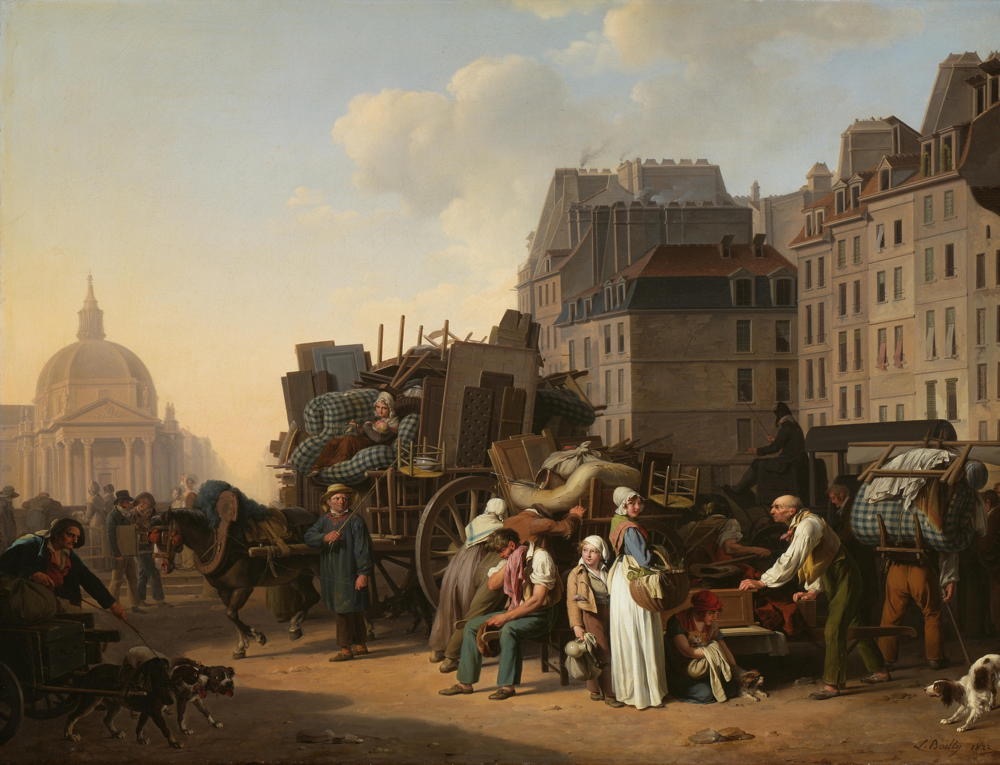
Louis Léopold Boilly: The Movings (1822)
" … every damned one of those takes considerable getting used to."
Of all human activities, Moving might be the most illuminating. When Moving, one becomes perhaps both their most vulnerable and their most liberated. Displaced, even temporarily, reveals many hidden edges and allows for much discovery, especially the sort one had sincerely hoped to avoid. Pull a dresser away from a wall and find the remnants of some earlier inattention, like a pair of cobweb-covered underwear. Idealy, Moving should only be attempted in private, but some possessions, like the infamous hide-a-bed, require at least a crew of two to move and, even then, will insist upon opening up when halfway up the stairs. The first and last scenes in many popular stories involve Moving, with the hero leaving on their defining journey and then returning to move on into another realm. There never seems to be any actual coming home, only MovingOut/In/Up/On.
I've been blessed with the opportunity to assist my son Wilder in his latest MovingOut/In/Up/On.
BackAlmostToGo
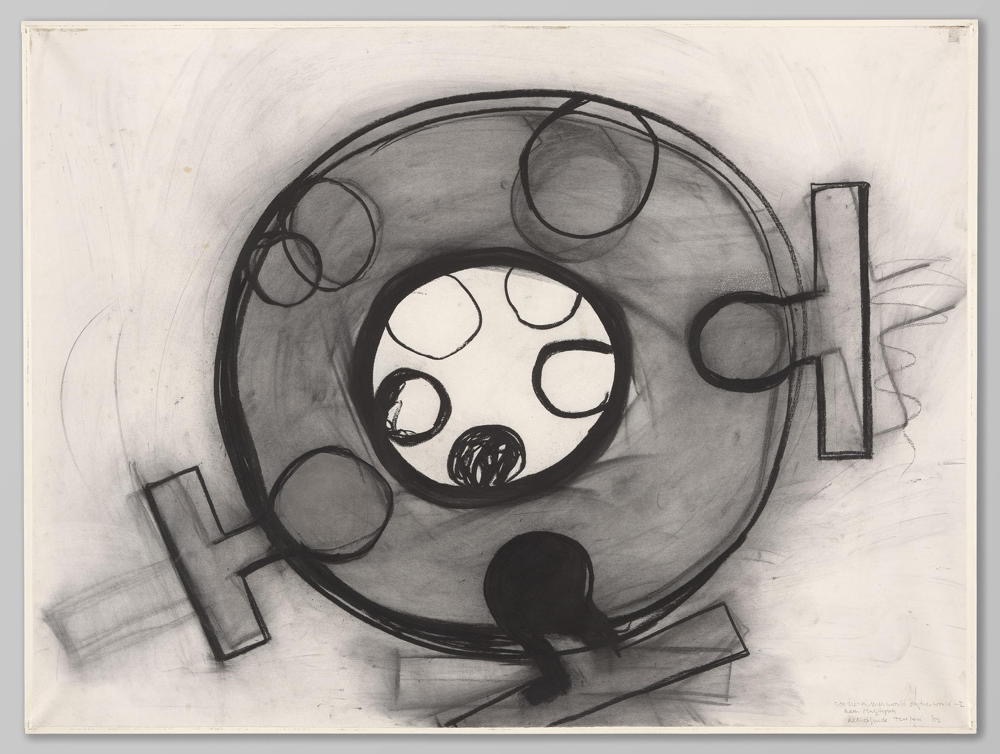
Kees de Goede: Studie Innerworld Outerworld I/, Naar Mug Stegner
[Study Innerworld Outerworld I/, To Mug Stegner] (1987)
" … I'll be faunching to get moving again."
A certain cadence profoundly influences every activity on this planet, or seems to. Time, as some wag noted, prevents everything from happening at once, but little prevents anyone from occasionally getting far ahead of themselves. This usually happens for all the proper reasons, with good intentions often contributing more than their fair share. Whatever the cause, the effect, if not permanent, does tend to be relatively immediate. A brick wall steps sideways into traffic. An unanticipated force field steals momentum. We get directed to head BackAlmostToGo without collecting our two hundred dollars. We seem incapable of seeing these experiences coming, even though they most often occur like a proverbial slow-moving train. After, we complain about how our senses must have left us behind, about how we must have become temporarily blinded. We're wary for a while after, sensing that our senses hide something essential from us. Our senses were never not withholding much of our experience from us. We register only tiny fractions of the perturbations around us, and we ignore many of those we experience as trivial or unimportant. Importance comes later if, indeed, it ever comes at all.
My latest fall came with the first inspection, a visit The Muse and I invited when it really should have been the contractor inviting.
Weekly Writing Summary For The Week Ending 8/15/2024
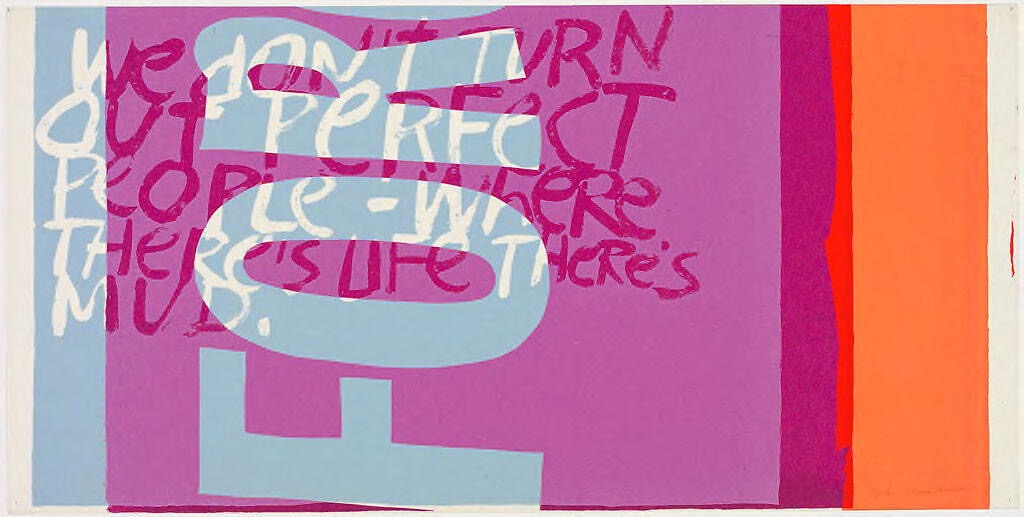
Corita Kent (Sister Mary Corita):
where there's life there's mud (1966)
Printed text reads: FOR[GET IT] /
we don't turn out perfect people
- where there's life there's mud.
Harvard Art Museums/Fogg Museum,
Margaret Fisher Fund
Copyright © Courtesy of the Corita Art Center,
Immaculate Heart Community, Los Angeles /
Artists Rights Society (ARS), New York
Once Upon A Time Aspired
As an acknowledged expert at project work, I would be remiss if I considered this designation to be an inoculation against experiencing any of what projects routinely serve their sponsor. One cannot avoid the inevitable, though one may, if remarkably clever, come to understand that inevitables say nothing about anyone's mastery or understanding. Acknowledged masters managed some of the most significant failures in the history of projects, and most of them eventually became godsends once the people involved accepted that they never were nor could have been in charge. Grace often arrives in sackcloth and shame, only to later tame discouragement. I cannot count the number of blessings I've experienced that were clearly curses when they arrived. It took time and patience for the universe to align around how the grand plan actually turned out. Nobody's very well positioned for determining success or failure as long as either metric seems to matter. Later, often much later, the blessing slips out from behind her disguise, and Grace sets down to have a spot of supper with you. Not one of us are masters, and none have an ounce of worthwhile advice between us. We're all still subject to the capricious winds and capacious disappointments. Not one of us was ever perfect, though several of us once upon a time aspired to become so. "Where there's life there's mud!" Sister Maria Corita
GoldenRules
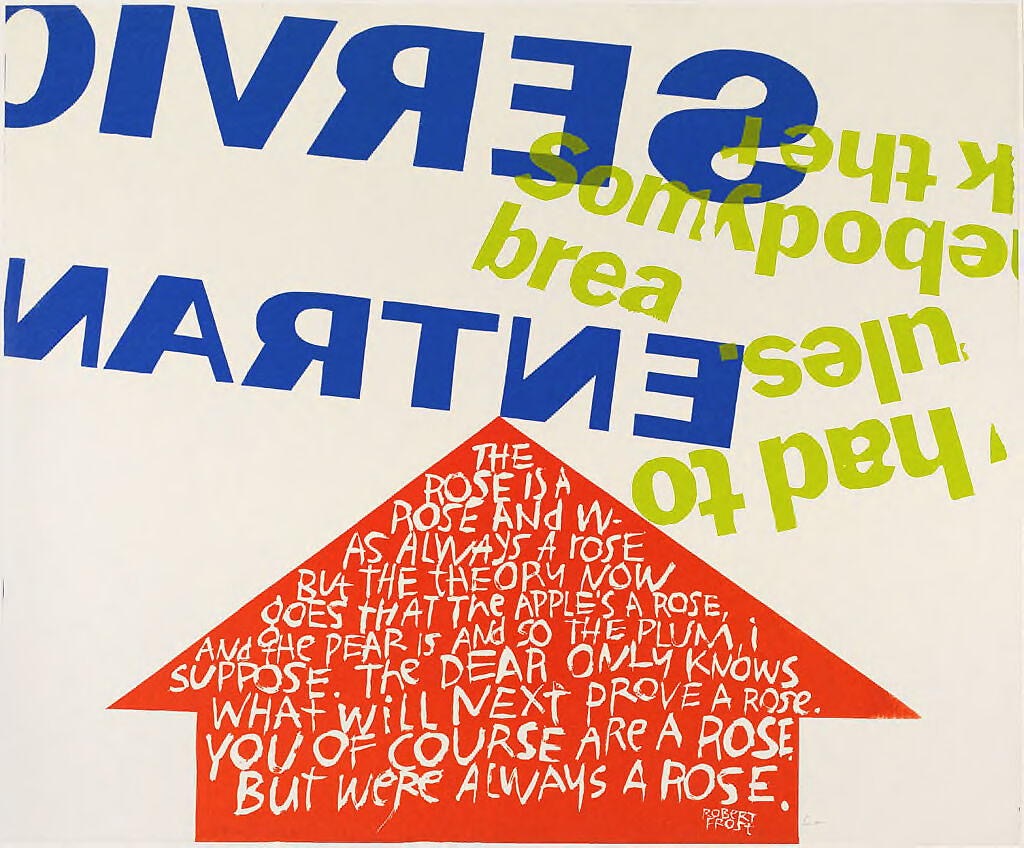
Corita Kent (Sister Mary Corita):
somebody had to break the rules (1967)
Screen print
The printed text reads: SERVIC[E] ENTRAN[CE] / somebody had to break the rules / The rose is a rose and was always a rose but the theory now goes that apple's a rose, and the pear is and so the plum, i suppose. The dear only knows what will next prove a rose. You of course are a rose. But were always a rose. Robert Frost
Credit Line: Harvard Art Museums/Fogg Museum, Margaret Fisher Fund
Copyright © Courtesy of the Corita Art Center, Immaculate Heart Community, Los Angeles / Artists Rights Society (ARS), New York
"I wonder every morning how I should live."
The question remains open regardless of how often it's answered: How should I live? It might be better understood to wonder, 'How should I live now?' because, with shifting contexts and ever-accumulating experiences, one's response might reasonably change over time. The aspiration to answer this question once and for all might be universal, for it's as inherently unsettling of a question as it is also apparently definitively unanswerable. I have caught myself getting glib in the face of it, resorting to some Hallmark® Card homily as if that might dispatch the troubling issue. I try to do unto others as I'd prefer them to do unto me, The Golden Rule, even though I know not everyone might appreciate what I’d warmly receive. I considered The Platinum Rule an improvement—to do unto others what they want to have done unto them—until I realized that I rarely have access to what others want to have done unto them. I'm not omniscient. Further, even if I knew focusing on their bare want could quickly get me into trouble or violate my own better intentions. I wouldn't want to supply drugs to a person with an addiction to satisfy some Platinum Rule.
The forms of these rules never change.
Inspecting
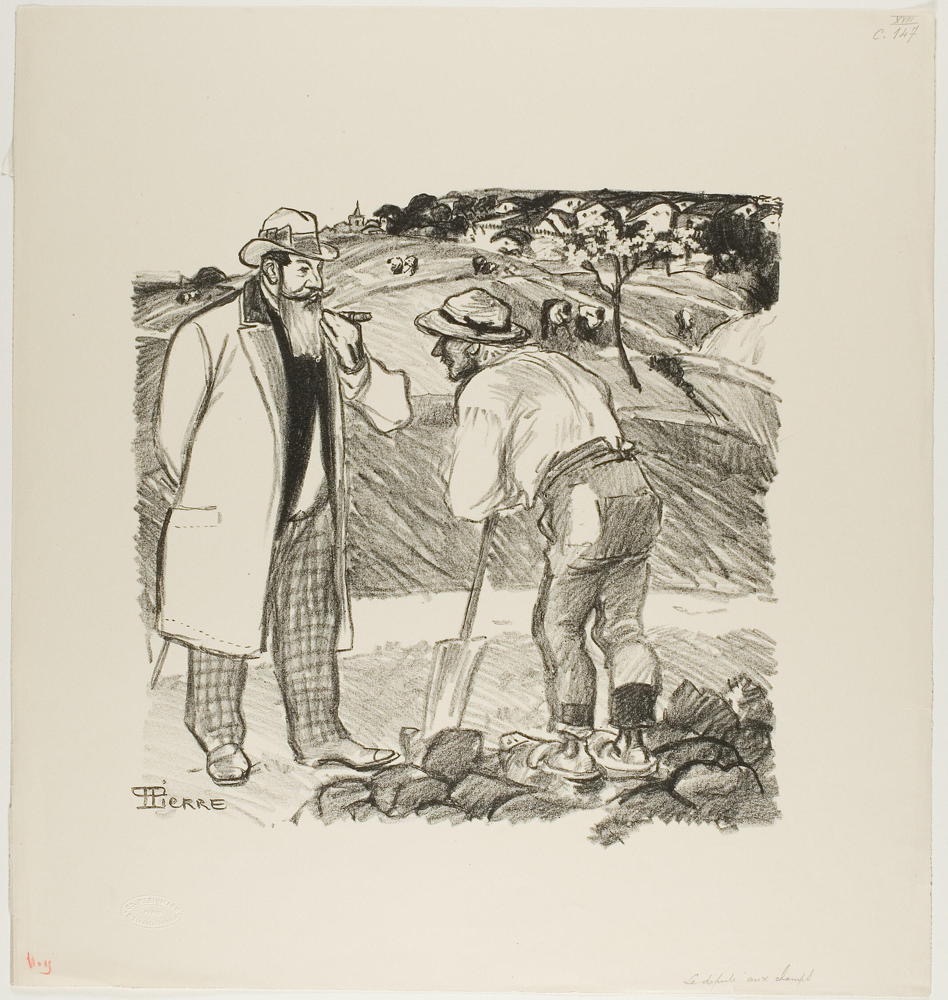
Théophile-Alexandre Steinlen:
The Field Inspector (April 1894)
"Placating paves more streets than protesting ever did."
When we finally collected the permit required to start our porch project, after nearly two long years of failing to satisfy its requirements, I asked about inspections because I didn't know the rules. The permit person said our contractor would know when to call for inspections, so I set that issue aside as beyond my purview. I had not thought another second about Inspecting until late yesterday afternoon when Joel, our carpenter, dropped by to survey progress. The footing had been poured that afternoon, and all seemed right with the world. Joel asked if the inspector had visited yet. He hadn't, as far as I knew, but I had not been trying to stay in the know on that issue. Joel went on to say that said inspector might insist that we encase the porch deck supports in concrete, too, and that he usually wants to see the rebar inside a form before concrete's poured. However, he often happily assumes the work was done properly if he knows the contractor. The footing concrete has already been poured. He could insist, if he wanted to be a real son-of-a-bitch, that we remove the newly poured footing to confirm it has the required rebar embedded in it.
This practice should be confusing because I'm not now and have never even aspired to become a member of the contractor society that lives and dies by the judgments and rulings of city inspectors.
Designering

Heinrich Aldegrever:
Ornamental Design with a Bat in the Centre (1550)
"We approximately understand what we're doing …"
Design, like almost everything, seems different in theory than it does in practice. In theory, Design must be complete before construction begins. Practice finds considerable overlap. We might diligently try to fully flesh out aspirations beforehand, but our context shifts once we start moving dirt. We often cannot foresee what will become evident after we've exposed rafters and taken down walls. More than fine-tuning occurs regardless of how complete the design seemed during preliminary discussions. The contractor holds more responsibility than they'd ever willingly contract to deliver and always have. They're most likely to notice the small incongruences that could explode into disaster. They're the ones present to see the plan's emerging incompleteness. They're the ones tacitly charged with continually asking the most uncomfortable questions.
Spontaneously mustered conferences are called. Jesse, the structural guy who will perform the follow-on effort, held clues for the foundation builders and vice-versa.
LevelSetting

Alfred Stieglitz:
Georgia O’Keeffe—Hands and Thimble (1919)
"I'll insist on seeing level even if some crookedness persists …"
On the third day, brick removed, the concrete contractors started pulling string and finding plumb. I asked Pablo if he was doing that, and when he confirmed, I cautioned him that many had sought level and plumb in the old house, but they had yet to find it. He insisted that he would persist and lay a footing upon which a level and plumb front porch would permanently rest. The Muse and I left town for the weekend while his crew prepared to quit by noon that Friday. I'm watering around the works this morning, waiting for the crew to arrive to start fitting rebar into the space. Tomorrow, I expect some concrete will be delivered, and the permanent part of the effort will commence on just the fifth day of work.
Pablo moves sure and fast.
FuturesPassing
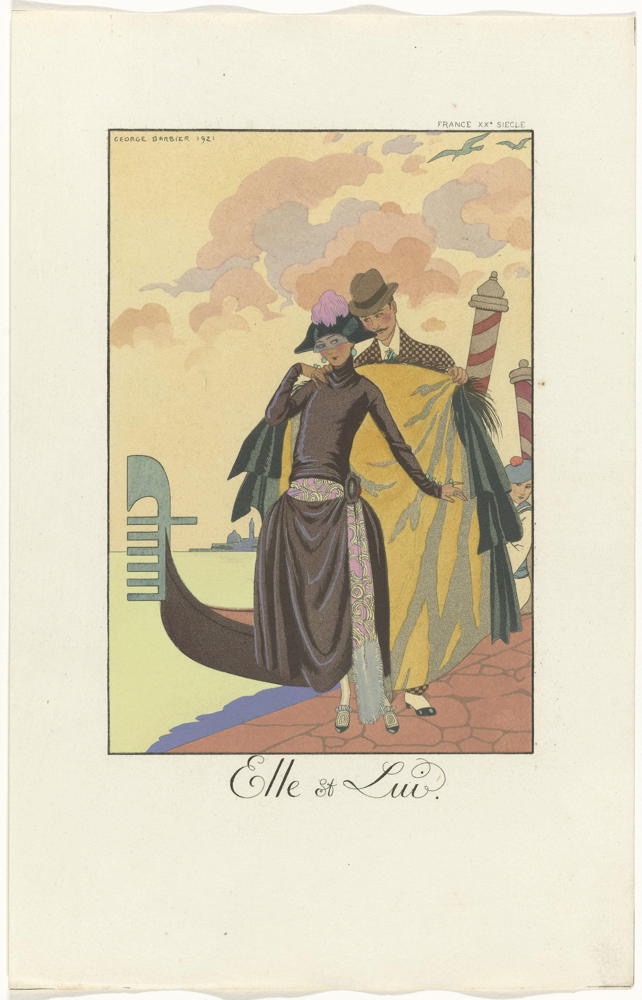
George Barbier: Falbalas et Fanfreluches: almanach des modes présentes, passées & futures pour 1922: Elle et Lui / France XXe siècle, [Falbalas and Fanfreluches: almanac of present, past & future fashions for 1922: She and Him / France 20th century,], (1922)
"The future doesn't hold a place for any us, thank heavens."
To a man my age, a trip anywhere becomes a trip into an unwanted future. I might depart aspiring to visit my past but inevitably return having glimpsed a dreaded next. It will likely become much worse than I imagine, but the hints I do glimpse leave me stunned. There was a day when the future seemed promising. Midcentury America featured posters promising flying cars and what now appear to have been early precursors to Spandex®. The flying car notion fell apart when encountering human potential. Had we understood the cost of combustion engine propulsion, we might have retained our attraction to wagons and horses. Still, we were smothering ourselves in horseshit then, and the invisible pollution from the combustion engine seemed a vast improvement. Maybe it was.
I had warmly anticipated a visit to Norstrom's flagship store, remembering when Nordstrom really knew how to run a flagship store.
Aches&Complaints
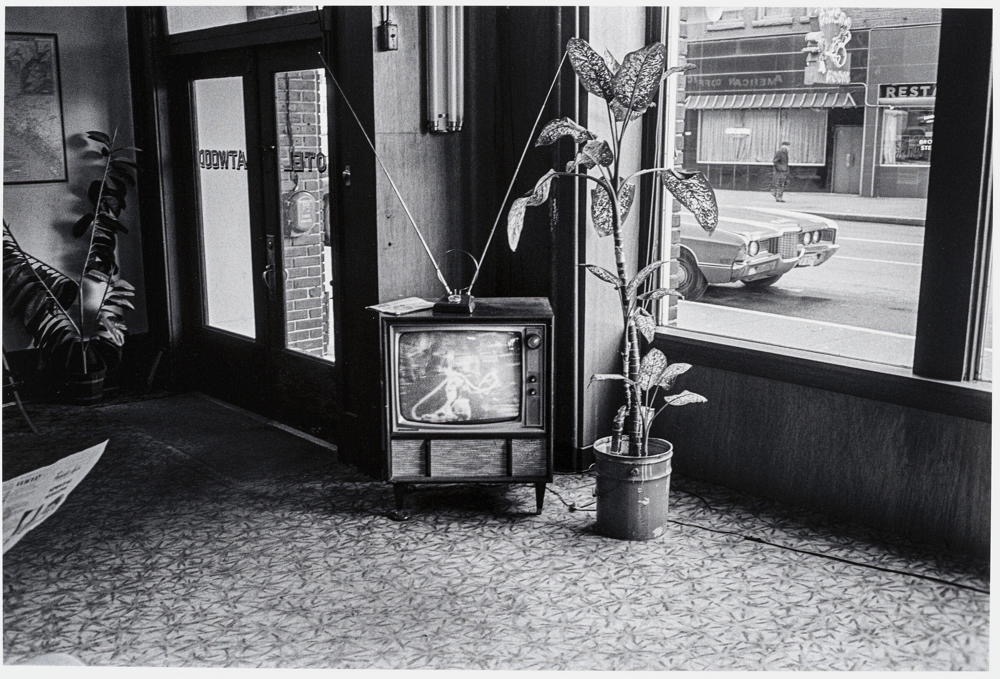
Dennis Feldman: TV and plant in hotel lobby – Seattle, WA – 1974 (1974)
"Sleazeattle embodies the sin of self-importance."
Driving into Seattle from the east on I-90, I was reminded of the many times I'd hitched along that road fifty and then some years ago. I much preferred to hitchhike that route, and as I drive now, I reflect backward on that time and place that no longer exists. Sleazeattle seems all but indistinguishable from the place I knew then. The street names remain unchanged, but everything else has become some post-modern approximation of the authentic article. I explained to The Muse that back then, there was no tunnel on the western side of the Lake Washington Floating Bridge. The freeway emptied onto surface streets that were never not tangled with traffic. We somehow slip through the newer approach and slide the two exits north on I-5 without difficulty, even though it's after five on a Friday. As usual, we must circle a few blocks to get The Schooner properly oriented to the hotel's loading zone. We checked in quickly, and I slipped across the street to park the car in the lot next to the Korean restaurant. Welcome to Belltown again.
We're doing a Jazz Alley show and dress for the occasion.
Weekly Writing Summary For The Week Ending 8/08/2024
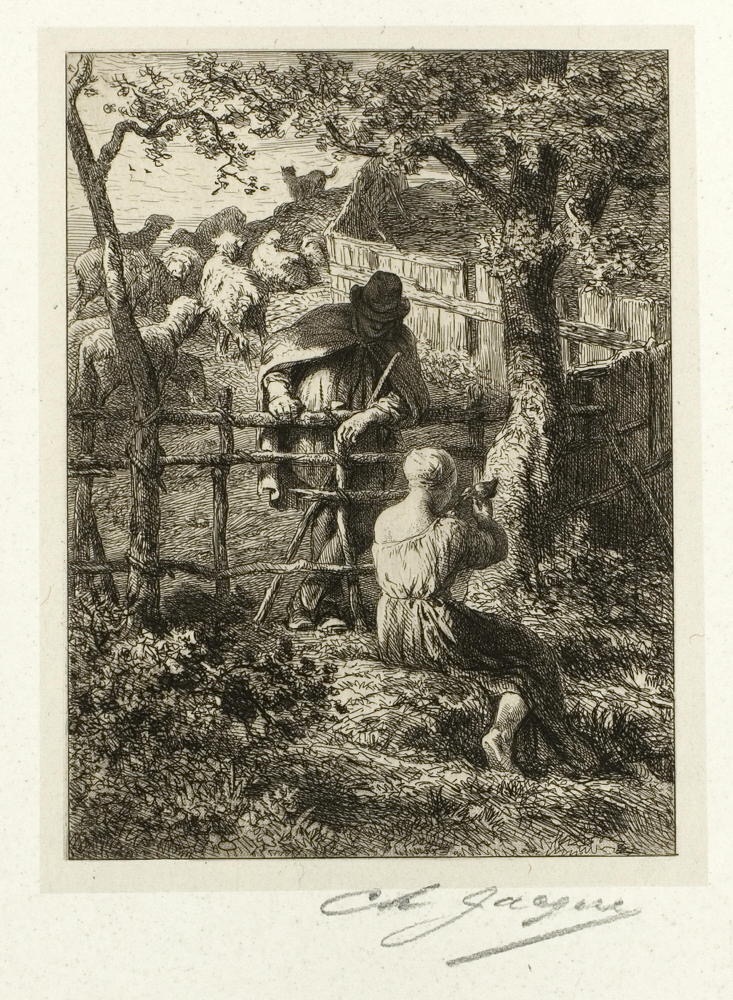
Charles Émile Jacque: Summer (1885)
Committing Sins and Seeking Penance
A spare year ago, I first experienced what my internist would later label Bursitis, a mysterious and painful inflammation in something I'd been blissfully ignorant I even had. It seemed like a made-up disorder, even though it kept me from finishing a painting project. I felt I needed that project as repayment of a debt I'd incurred when first refinishing that surface. I had penance to pay, but the Bursitis prevented my repayment. I hired a painter and nursed my shoulder, feeling decrepit. A year later, I'm still learning how to integrate my now definitely more tender shoulder into my existence. I'm learning that if I don't challenge The Bastard Bursitis, it tends to win. When I buck up and engage with it anyway, whatever discomfort I initially feel quickly disappears. The harder I work it, the more it seems to reward me by forgetting to punish me for my indiscretion. This story perfectly fits my predilection. I want to believe that personal gumption overcomes physical affliction, even though I know that notion to be essentially fiction and dangerous. I live an elaborate fiction, growing ever richer with each fresh experience. One day, the sum of my continuing indiscretions will probably catch up to me. Until then, I'll continue committing sins and seeking penance.
QuickStart

Unknown English Artist: Linen, plain weave;
embroidered with wool and silk in tent stitches:
Harvesting (1701/25)
"What began as endless frustration …"
Two days following the FirstMeeting, the porch renovation project enjoyed a QuickStart. By eight-thirty, deck boards were being pried up. By noon, ceiling props were already being placed, and the brick planter wall was demolished. By the end of that first day of actual work, the ceiling had been thoroughly propped, and part of the brick perimeter had already been toppled. I constructed a peanut gallery comprised of a vintage metal lawn chair and a garden bench where Kurt, Our Painter, and I sat through the early afternoon making observations as the crew did what crews have always done. We considered it a credit to Pablo, The Concrete Contractor, that the crew seemed light-hearted, joking good-naturedly while they worked. Pablo occasionally called me over to point out some fresh absurdity in the construction he and his crew were dismantling. One only knows once deconstructing just how flimsy the prior renovation had been, though we had always suspected.
We decided that the brick front had indeed been cosmetic because the columns didn't extend down to the ground.
Denialing
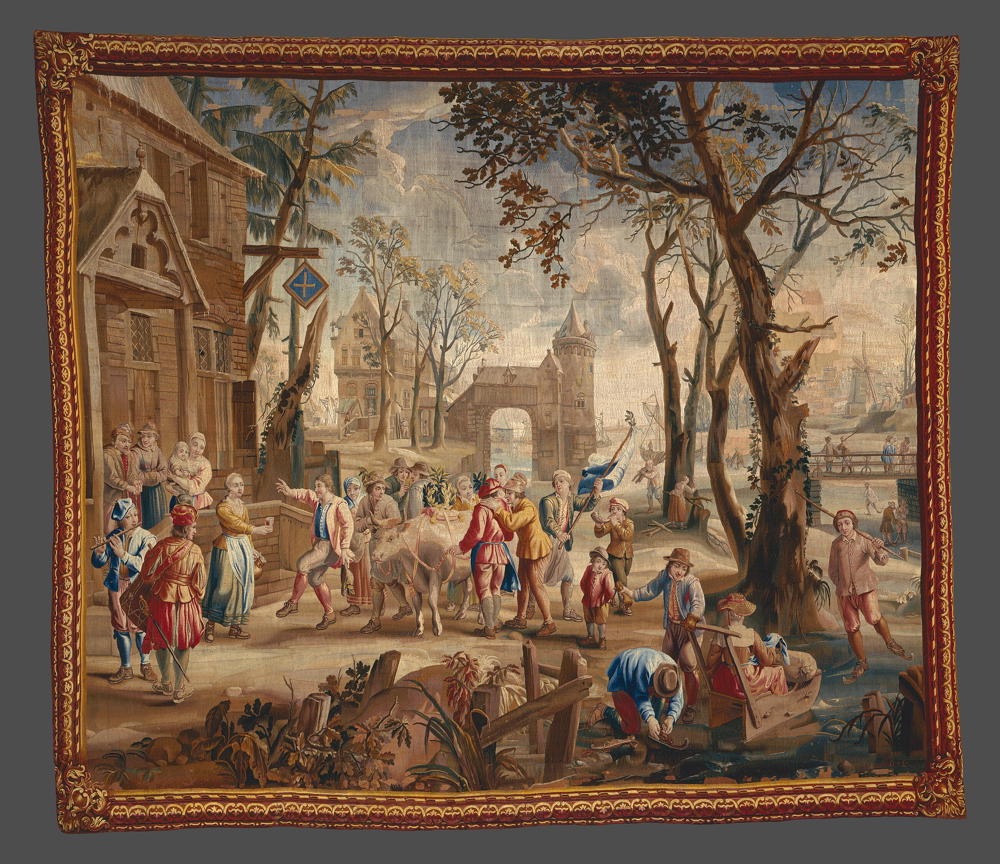
After a design by Jan van Orley
Woven at the workshop of Daniel IV Leyniers:
Procession of the Fat Ox from a Teniers Series (c. 1725)
Denial remains the first stage of acceptance.
"This process should be upsetting."
The true purpose of that First Meeting wasn't satisfied until a second meeting took place. The concrete contractor, the lead player in this production, couldn't make the initial meeting, so we convened a supplemental session for those who couldn't make the first. Pablo, the concrete contractor, and his assistant Wilbur asked harder questions. The conversation began light-heartedly enough but quickly degraded into difficulties, which was precisely its purpose. We tend to start projects filled with promise. We neglect to recognize what must be sacrificed to achieve that promise, and it always comes as a profound surprise when the first hints of underlying costs surface. I began my contribution by suggesting we could support the roof from the top of the deck. I even took Pablo to the basement access panel to survey the underlying infrastructure. He seemed to become thoughtful as I sold my proposal. Once we returned to the front porch, to the top of the deck, Pablo asked the Golden Question.
We had been seeking problems rather than solutions.
FirstMeeting
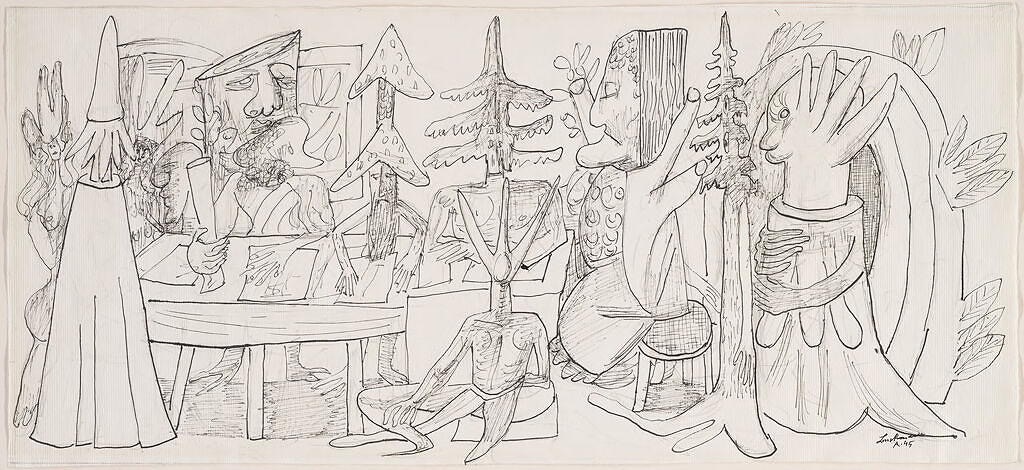
Max Beckmann: Meeting of the Forest Owners (1945)
"Now I understand how I will get to trust him."
The FirstMeeting on any project becomes a defining moment, for this gathering always occurs unselfconsciously. The attendees have yet to fall into whatever identities close association always encourages. They're as close to their shoes-off-selves as they'll ever be, if only because nobody quite knows who they're supposed to be yet. Yes, some will show up intending to show well. Others will come inquisitive, but each will come wrapped in an innocence they will quickly abandon in favor of forward momentum. In this session, patterns will make their first appearance. The group's DNA will be present but not yet fully evident, disclosing only hints. Attendance alone will communicate something, for not everyone will make the meeting. Each explanation should say something about who they might become once they join this ensemble. I try to maintain my attention.
The concrete contractor, by far the most crucial player in the early part of this effort, had his sister, who answers his phone, call fifteen minutes before the scheduled start to explain that he'd had a mechanical failure during a pour and couldn't get away from his current job site for the meeting.
Mustering
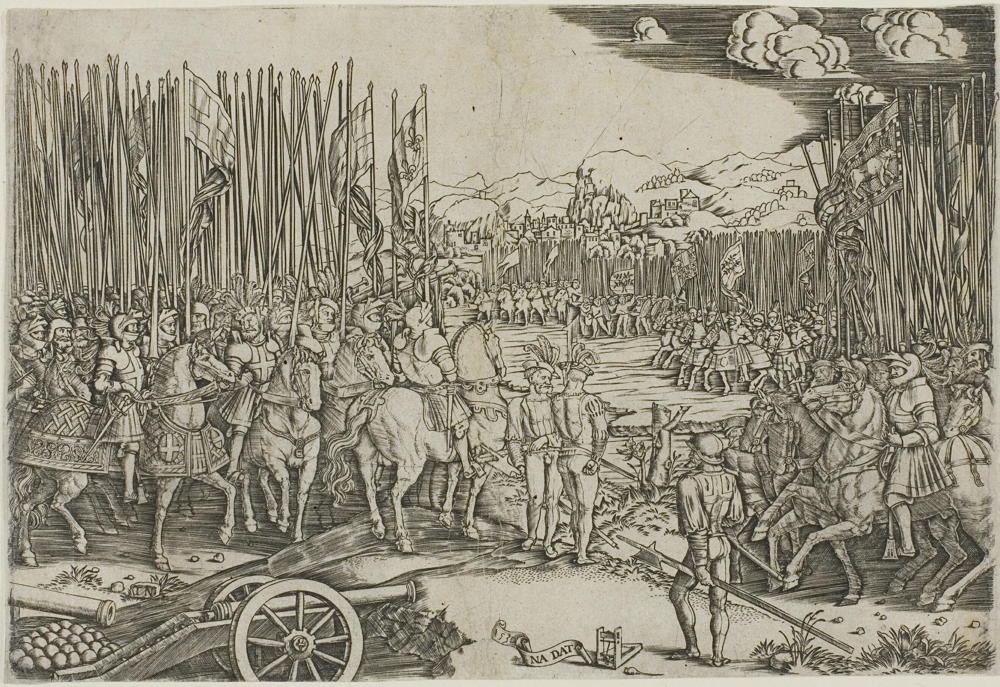
Master with the Mousetrap: The Two Armies at the Battle of Ravenna, 1512 (c. 1512, printed 1530)
" … we're rapidly closing that overlong-open window."
The scheming part's over now. We're finally Mustering the forces necessary to affect the changes to the front porch The Muse mandated two summers ago. The project hadn't started, couldn't have started, until after the permit was approved. Before then, we were scheming, projecting, and assessing. Permit approval made this project inevitable and, finally, surprisingly, real. Before, it was theory; now it begins to become practice. Very little's settled yet. We've painted only in the broadest strokes. We've spoken as if we knew even though we couldn't have possibly known. We wanted estimates for an effort nobody could imagine. Once the principals converge to imagine together, we will begin the real work of assessing actual effort and focusing forces. So far, I've given notice that we have approved permits, doubtless a huge and important milestone even though we really haven't started anything yet.
The first presumption of many to die in this effort was the notion that we might keep the mess from intruding into our lives.
HeatExhaustion
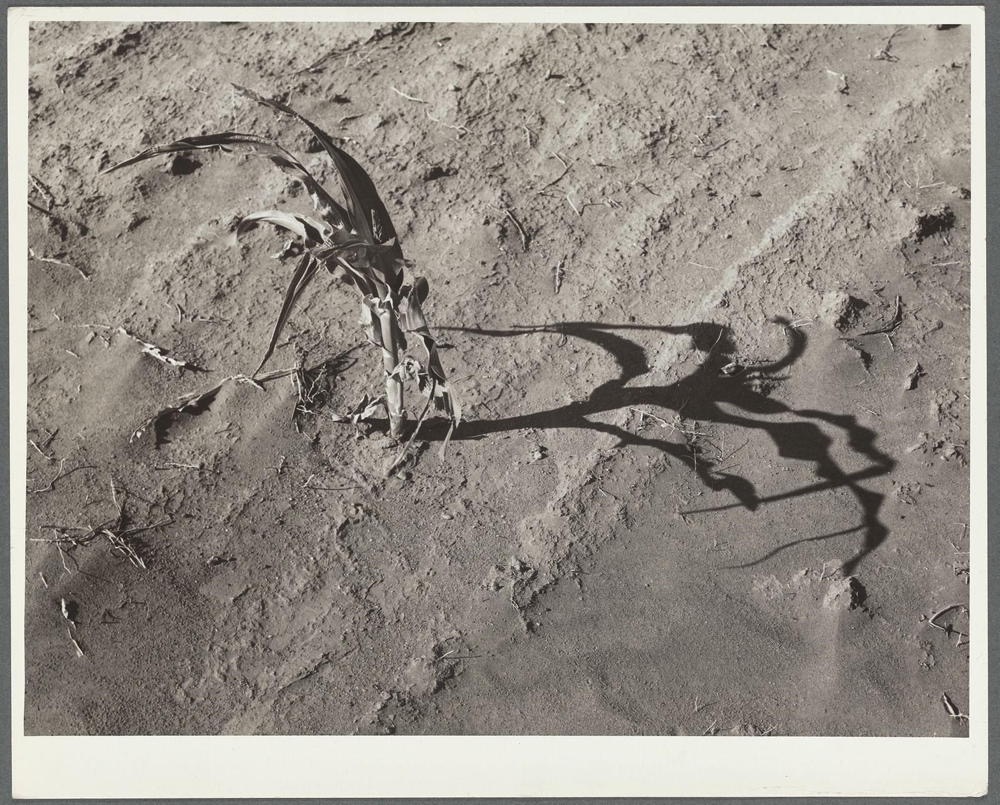
Arthur Rothstein: Corn withered by the heat and chewed by grasshoppers. Terry, Montana (1936)
" … Grace even within this seeming wasteland."
By August, the surface of this valley becomes burnished buff beige. The days start growing noticeably shorter, though they each nonetheless seem endless. On nights when the outside temperature can't even fall below seventy, The Muse opens up the house before she slips into bed when it's still hotter than eighty outside. I wake from fitful sleep to flip my sweaty pillow before finally surrendering to wee-hour wakefulness again. Nights seem no less interminable than days. The cats don't even bother to come inside those nights. They return listless in the morning to leave half their breakfasts uneaten. They hug cool pavement or find a soggy corner of the lawn to lounge on. I envy their soggy corner.
Our basement provides the only respite.
BustinLoose
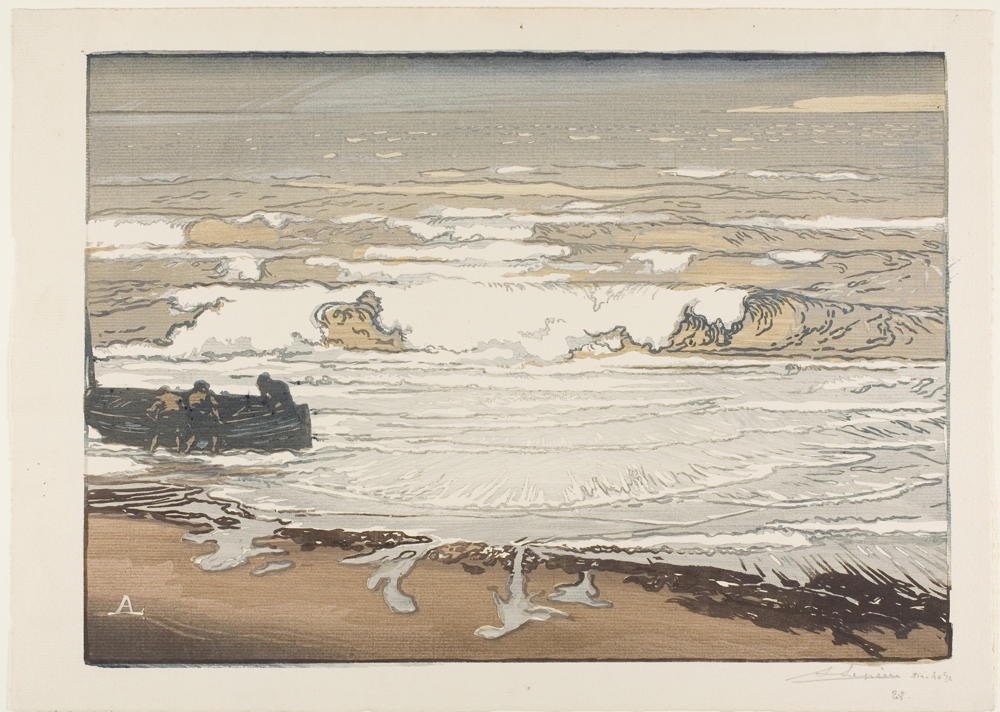
Louis Auguste Lepère: Breaking Waves, September Tide (1901)
" … just gravity or something similar having her way with us again."
If I am to take away any notion from this discontented summer, let it be the conviction that things seem like they will never be any different until a slight difference appears one day; then, things can never be the same again. This abrupt nature of change belies the idea that it might occur gradually, according to the Boiled Frog Theory. However, even in the Boiled Frog Theory, the frog has no sensation of boiling until it is too far gone to be rescued. He, too, senses no change until it "suddenly" becomes inexorable. Then, that familiar lifestyle's already over, never to return. This seems the truer nature of life, of living. We might be forever changing, but we only sense we're changing on relatively rare occasions after it's already inexorable. This is another face of Grace.
Those who claim to be masters of change are probably lying to themselves.
Weekly Writing Summary For The Week Ending 8/01/2024
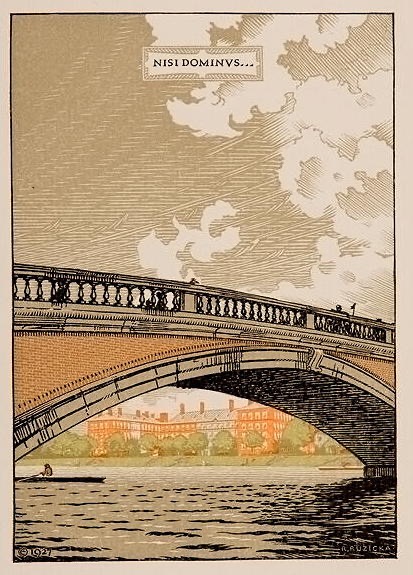
Rudolph Ruzicka:
Weeks Memorial Bridge, Cambridge, Massachusetts
(1927)
Unchangeable Until It Isn't
I have been quietly and happily dispatching long procrastinated chores this summer. Such efforts only commence after I've reached a certain level of self-loathing. I can shove stuff to the back of the closet for only so long, and it's over once I cross that border. I'm not reforming then, not repenting, just entering a later stage of the same form I had been inhabiting. It's a magical time, though. As I convey each clog, another appears, and each seems less daunting to dispatch. I gained a growing sense of personal authority as if I were discovering long-lost superpowers. Those powers were never lost but merely waiting for conducive conditions to arise. This summer of my discontent presents those conducive conditions, like late summer, which presents differing conditions from seemingly endless same-old, same-old days. I might never understand how change arises from sameness, but I can nonetheless depend upon its eventual emergence. Nothing can never be quite the same again, or really even for a first time. It's all different except my discernment, which seems unchangeable until it isn't.
Doubt

Wouter Pietersz II Crabeth: The Incredulity of St Thomas (c. 1626-30)
"I might conclude that confidence isn't required …"
I pity all True Believers, for they cannot experience incredulity, and without that small skill, they become a shill for every come-on and con artist they encounter. The True Believer insists that their faith sustains them while it nibbles away at whatever originally made them human. Only machines seem capable of unambiguous engagement; every other entity reserves something to preserve itself in case it makes an incorrect assessment. We gingerly place a toe in the water before jumping in. We likewise invest as if we could lose everything rather than as if we were sure from the outset to win. Caution trumps certainty—Doubt conditions belief.
My mother ended every phone call I ever had with her by saying, "Well, I don't know much."
Disappointment

Jan Lievens: Still Life with Books (c. 1627-28)
"Maybe I was meant to f#ck that last one up!"
This world sure can disappoint. It can encourage fantastic aspirations and then fail to reward them. It asks for dreams and then seems to scheme to find ways to undermine them. It wants your best before sending its regrets. We seem somehow destined to fall short of something. Always a fly in the works and one in the ointment. What's anyone to do? We try to remain faithful to largely fallacious ideals. We believe or insist we do, even though we couldn't reason through to resolution, either. Some days, it seems we're all pretending just as hard as we can, actively ignoring the obvious facts at hand. We might not be able to afford to know or afford to understand, so we plan with studied ignorance before blaming the shortfall on happenstance. We inhabit a hyperactive Disappointment machine.
Some people seem less vulnerable, as if they are exempted from the usual consequences.
Delusion

Odilon Redon: Flower Clouds (c. 1903)
" … not even Delusion could save my bacon this time around."
It might be true that every genuinely great idea began as a Delusion. The great discoveries of science often started as no more than metaphor, awfully odd-seeming combinations of concepts as yet unproven. It might also be true that if one hopes to make valuable observations, one must increase their tolerance for Delusion. Those too married to reality rarely see anything creatively, for reality drives hard bargains. It struggles to suspend its disbelief. It relies too heavily upon the familiar. It wants to know the correct answers. Delusion, on the other hand, was never that well-grounded. It makes belief rather than relying upon certified sources. It thrives on what-ifs and speculations, deferring to make its point until after it's considered its space. It understands that even a wrong foot breaks the inertia of stuckness and that movement might be more important than initial direction.
The transition back from a decently Delusional start can prove daunting.
Defiance
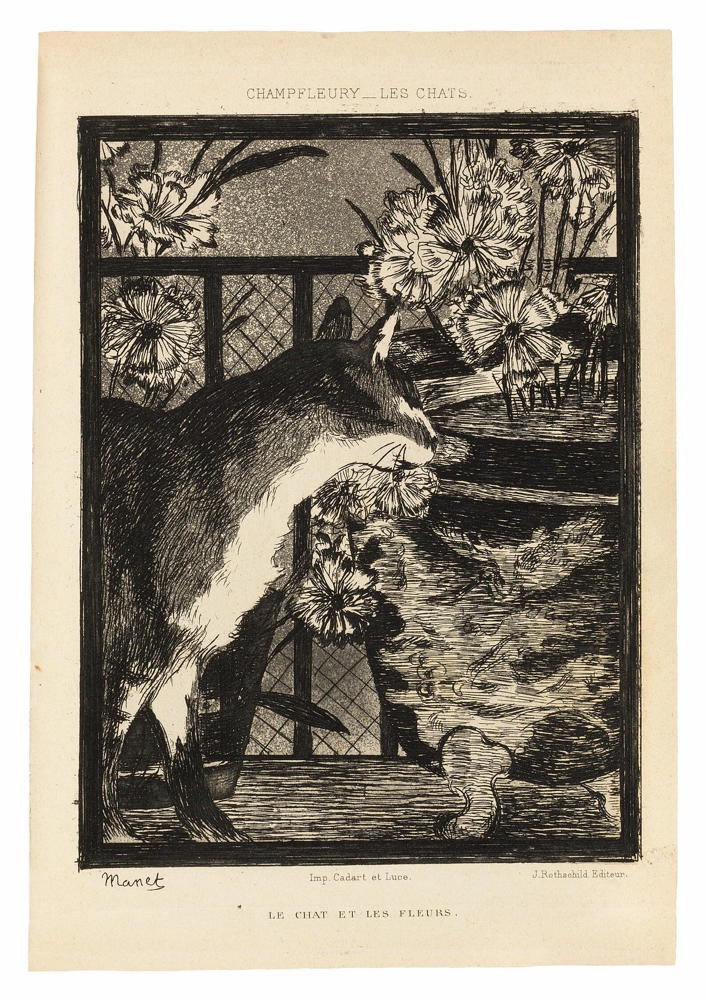
Édouard Manet: Excerpt from a book, Les Chats (1870)
published by J. Rothschild
and Libraire de la Société Botanique de France
typography by Gustave Silbermann,
printed by Cardart et Luce
Book with five etchings, two with aquatint and three with plate tone, one color lithograph, and line block prints, two with hand-coloring, with letterpress in black on ivory wove paper, with cardboard and paper cover and leather spine with gilt lettering
"May Grace grant us respite from our Defiant nature, even when we steadfastly refuse to ask for it."
Go ahead. Tell me not to do something. Refuse permission. Forbid anything. I dare you. I encourage you, for nothing better fuels my forward momentum than a decent or even an indecent Defiance. I will insist, somehow, on getting satisfaction, and I will damned well succeed. Vengence becometh mine in those moments, and I wield my very own terrible and shockingly swift sword. I might even become self-righteous, for I will feel wronged and surely—certainly— set out to somehow right that wrong, believing it my birthright. It will become a matter of honor and self-respect, and I might barter every ounce of respect anybody other than me ever invested in me, but I will succeed, even if the success kills me. Do not ever tell me, "No!"
I think people generally refuse to do what they're told.
Diligence
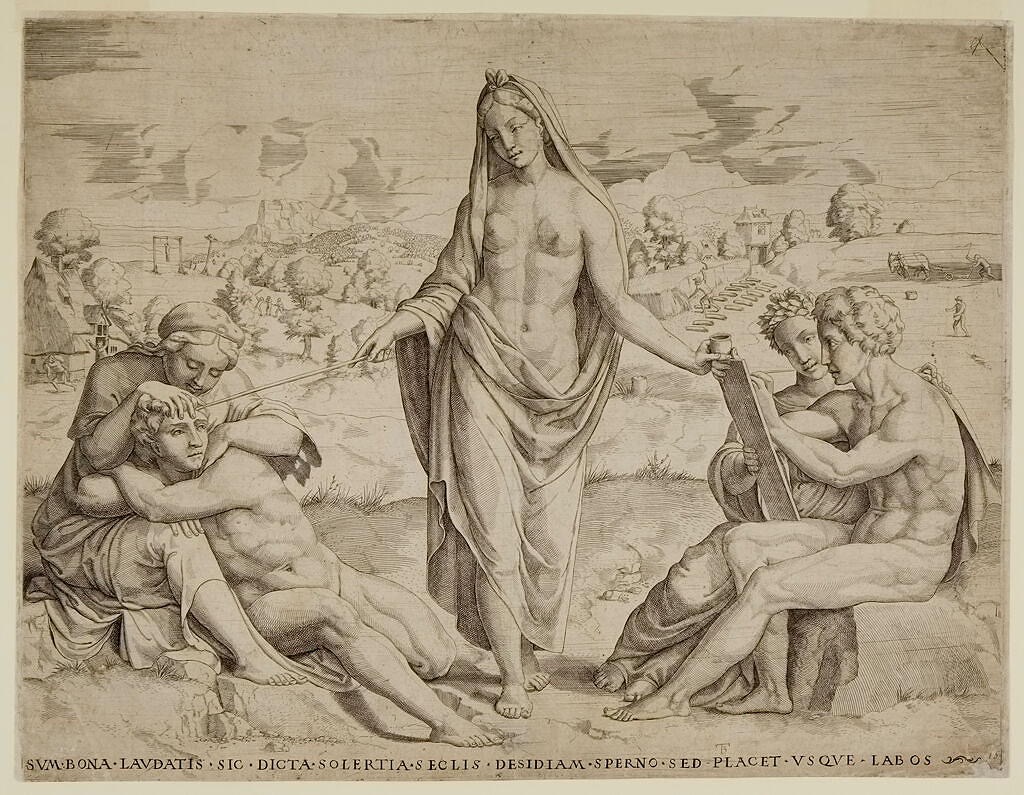
Cornelis Bos: Allegory:
Industry Rewarding Diligence and Punishing Indolence
(c. 1540)
" I seem to need a somewhat stiff wind in my face to find that most satisfying sort of Grace."
I think of myself as more diligent than disciplined. Diligence doesn't need discipline, for it seems to operate on distraction. I loosely focus my attention, then keep returning to the task; no or very little discipline ever required. I can certainly trudge much further than I can march and probably even further than I can stroll. I need not even know my destination to begin, on the principle that any direction, diligently followed, will ultimately guide anyone to a very different location. The difference need not matter so much as its magnitude. The mountains might not be far from my starting point, but they represent a vast difference that naturally seems like concomitant progress. Slow and steady might not win any race, but it does tend to fuel persistence, which can often outlast even the most dedicated competitor. How did I do that? One diligent inch at a freaking time!
I do not operate to any sort of grand plan.
Discipline

Will Hicock Low:
He Met Within the Murmurous Vestibule,
His Young Disciple (1885)
"Almost nothing demands more Discipline than this!"
I was up at 2 AM yesterday, wondering if I still possessed the Discipline to continue writing or if I ever truly possessed it. Discipline was never one of the more tangible possessions. It does not hang near any surface but remains hidden within time. It only ever appears over some longer duration than any instant. I've been meditating twice daily since the Spring of 1974, over fifty years. I've missed a handful of sessions over that period, but no more than the sparest handful, so it might seem beyond question that I possess Discipline, yet I still question myself. Discipline dispensed in twenty-minute increments might be insignificant and hardly seem to make any difference. I cannot assess the difference fifty years of meditating made because I neglected to include a control in the experiment. I would have needed a clone to not meditate over the same period to determine if the Discipline has made any difference.
I can say that I can sit still for any odd half hour.
Weekly Writing Summary For The Week Ending 7/25/2024

Jacques-Philippe Caresme:
Priest Making an Offering Accompanied by Nymphs and Satyrs (18th century)
Just My Sanity
I write as if my life depended upon it. It doesn't. Almost nothing's more ephemeral than the written word. Even the spoken word outlives it. Unless spoken and shared, writing sits there like a freeze-dried entree, waiting to be reconstituted by breath and tone. Writing's all alone, even if it's been distributed in several languages, even once it’s been designated a best seller. Sales don't have anything to do with it. The most widely misunderstood works in history were also among the most popular. Much can and does go awry when reconstituting an entree. The author's intent might have never been all that apparent to the author, either, so the tea leaf readers who claim to understand blow smoke. Why would any reader care about any writer's intentions? Reading was supposed to be a form of entertainment. Until and unless it's fun, it's always much better left undone. If it's not enjoyable, reading becomes a deplorable act, worse than wasting time, though time might exist solely to provide raw material for producing waste. This writer deliberately wastes his time in the hope that readers might more usefully employ theirs, reconstituting his entrees. My life does not depend upon this exchange, just my sanity.
Whelming
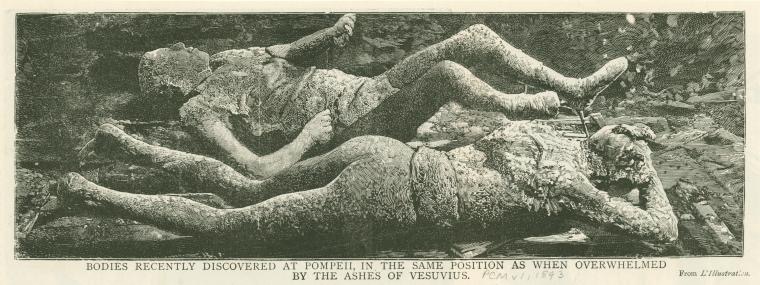
Still Image, Periodical illustration, by unknown photographer:
Bodies recently discovered at Pompeii, in the same position
as when overwhelmed by the ashes of Vesuvius (1893)
"Why would I expect anything to feel any different now?"
I might be a master at overWhelming myself and also at master at underWhelming myself as well. I hold no middle or middling ground, only extremes: swamped or parched, tossed or drowned. I might need a vacation, a break from my usual expectations since every one seems to overwhelm my coping mechanisms. I consequently feel trapped in a world beyond or beneath me, chalking up experience only as an incapable contributor. I figure nothing out. The instruction manual only complicates use. Experience further confuses rather than informs.
I'm almost certain this Whelming amounts to a self-inflicted state.
Aimlessly

Torii Kiyomitsu 鳥居清満: Man Fitting Arrow to Bow
(Edo period, 1615-1868)
"I'm hope I'll be finished by sometime next week."
I've heard it claimed that none of us know how to use the many systems we rely upon. I might use five percent of our Subaru's features. Occasionally, I'll get in trouble and have to ask The Muse to look something up in the absurdly voluminous user manual, a volume within which I cannot successfully reference anything. Even my lawn mower, broken for three weeks, remains a cipher except for the narrowest of uses when mowing lawn. The many systems on my MacBook Air remain largely vaporware, for I might employ one percent of their capacity. Whenever I attempt to do anything there, I come close to the edge of my universe. I often enough fall over into Neverland.
Just this morning, trying to capture the illustration for this story, my usual museum browser refused to find anything.
AKingsGambit
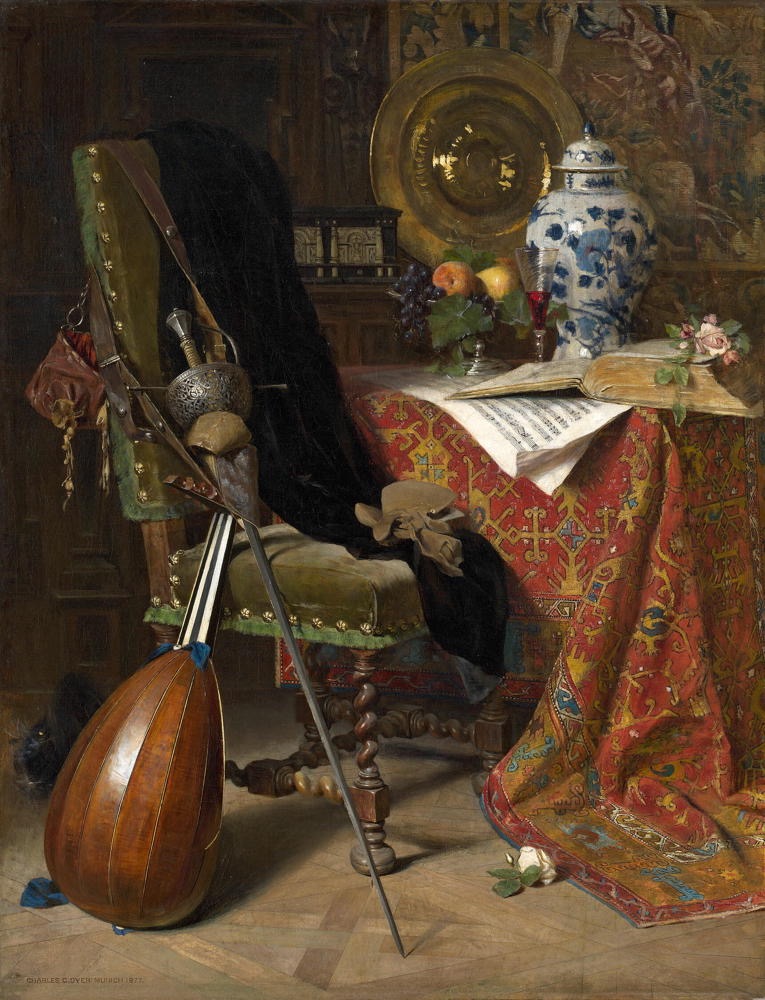
Charles Gifford Dyer: Seventeenth-Century Interior (1877)
" … positively evolving to the utter astonishment of its recently confident opposition …"
I thought the game had begun, but it had not. Preliminaries had been happening for years without an encounter, then that first one disappointed many. I didn't witness the event, having better things to do than watch some boob continue making a public fool of himself. Those who witnessed left shaken by their champion's performance even though his unworthy opponent never managed to commit a single truth. Their champion had more than competently performed the duties of his office, and nobody except his unworthy opponent and his minions had suggested that he was unfit or incapable of a second term until that single disappointing performance. Then, partisans joined the foes to insist that Joe should go. I opposed these moves. I thought them presumptuous. As with most things Presidential, the people have little understanding of anything associated with the role. I figured he'd know if Joe needed to go and act accordingly. He'd never shown any tendency to put himself above his country, unlike his unworthy opponent and, to my mind, his hankie-twisting so-called supporters.
Nobody saw it coming.
Irrelevance

Gustavs Klucis (Klutsis): The Development of Transportation:
An Important Task of the Five Year Plan, Poster, Print (1929)
"May we all experience the Grace that only achieving our own well-earned Irrelevance could ever provide."
From the earliest days of the Soviet Union, the Five Year Plan worked as a central focusing tool. It codified the aspirations of the ruling class, making them possible to describe and enforce. The government imported a small army of American engineers, each schooled in the so-called engineering science of Frederick Winslow Taylor, the self-proclaimed Father of Scientific Management. Employing techniques proposed and affected by Winslow's assistant, Henry Gantt, these engineers created plans to produce the most remarkable products. Whole industries were invented from scratch as the Soviets attempted to jump from feudalism into the modern world in a single great leap forward.
Most of these plans came to naught but the prosecution and execution of those Soviets who created them because they were naively drawn.
Travesty
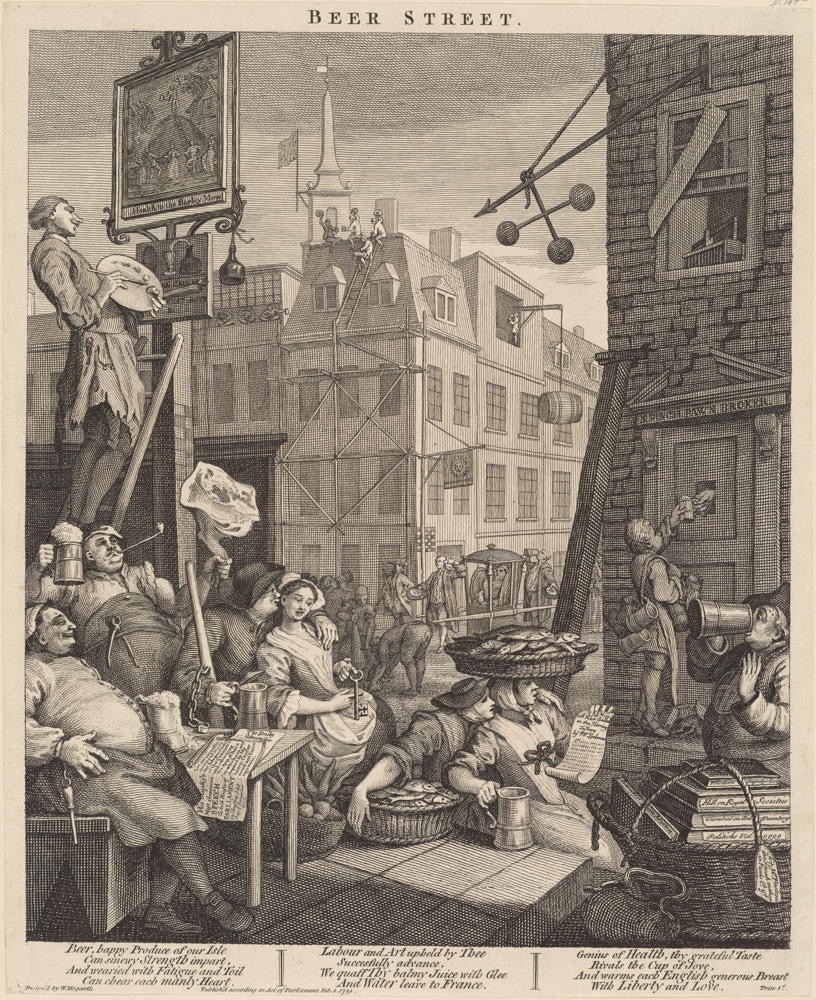
William, Hogarth, Printmaker: Beer Street (1751)
"Can anybody find me an ESB, please?"
After a five-hour drive and four hours of The GrandOtter's baby shower, I felt more than ready for a couple of beers and a spot of supper. Constantly aware of my surroundings when out on the prowl, I'd spotted a place on our way over to the hotel that looked as if it might fill the bill. The Spot, a so-called Sports bar conveniently located less than a half mile from our hotel. Its website claimed that this bar had been operating continuously since the Kennedy Administration. The menu looked typical bar fare and listed that they carried a beer I rarely see anymore, an ESB or Extra Special Bitter, a common enough brew in Blighty but seldom seen in this country.
Call me old-fashioned, but I prefer my beer to taste bitter. I prefer beer with flavor.
Goner
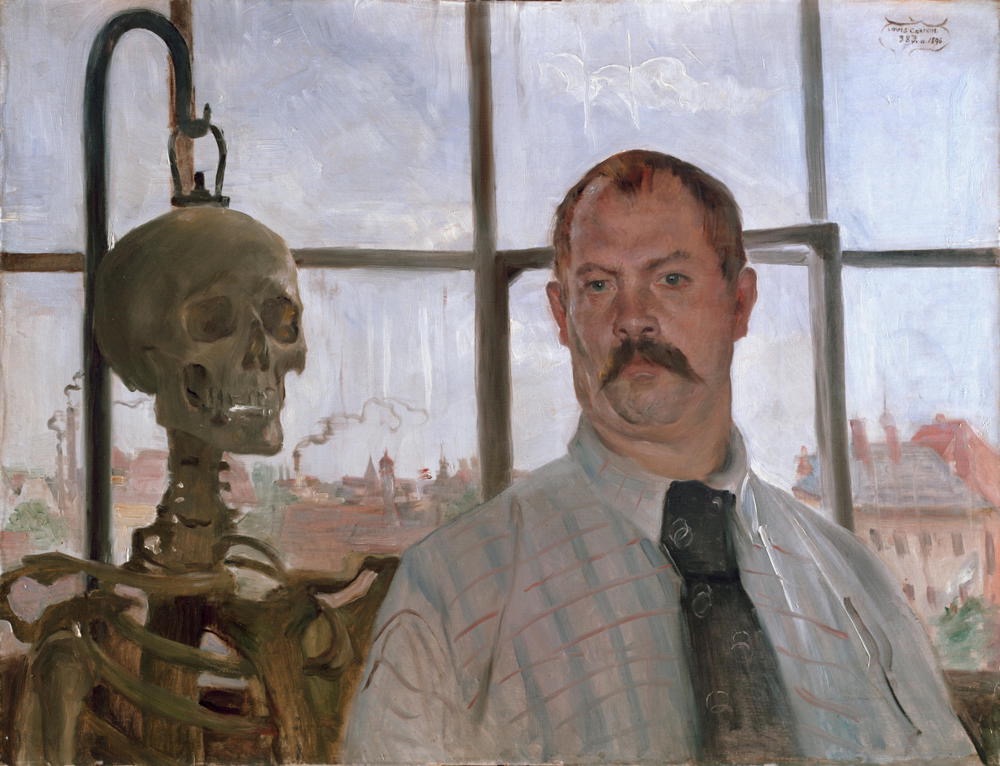
Lovis Corinth: Self-Portrait with Skeleton (1896)
"Grace visits just before such exits."
I never rise more enthusiastically than on those mornings I'm going away. My imminent absence tends to prize out my most prominent presence. I might dawdle every other morning, but these mornings, I'm focused, for I will soon be gone and unable to water the yard, incapable of performing even the least of my usual maintenance. The cats sense that something's up, and they're there fawning for an early breakfast, feigning indifference. I sense that they understand my importance to their existence, and they might doubt my dedication when they watch my taillights disappear a little too early some mornings. They know if only because we've left a window open that we will not be back to feed them supper or to provide that odd lap on-demand later.
I might rail about the need to get away for a couple of days, but I faunch at the prospect.
Weekly Writing Summary For The Week Ending 7/18/2024
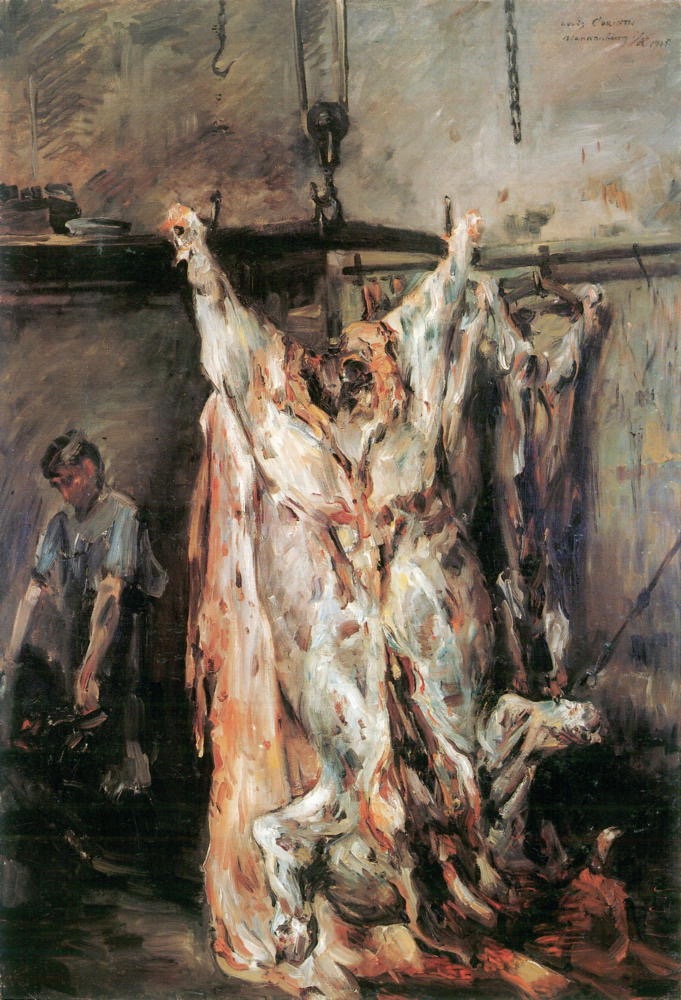
Lovis Corinth: Slaughtered Ox (1905)
Stop Clutching Their Pearls
As if this world had not grown weird enough, we now have MAGA Democrats, people so devoid of strategic integrity that they're willing to discard a winning administration for less than a handful of magic beans. They seem untroubled that they cannot name a single qualified replacement for the ticket most likely to win, all at the suggestion of a felon and the worst administrator ever to hold office. I expected the Dems to clutch their pearls and wring their hankies. Those are their traditional election-year antics. I had not anticipated that so many suddenly started believing in polls that nobody had ever believed in. Not even the pollsters believe their own polls now. We inhabit a distorted playing field whose dimensions have been obscured by the repeated torturing of traditional rules of engagement.
The opposition religiously refuses to commit a single truth as if incapable of such an act. The incumbent has consistently been underestimated. The almost unforgivable element might be the lagging self-esteem this whole defection represents. Dems have always struggled to stand by their man or woman when the going got real. Berney proved to be enough distraction that the felon was elected the first time. (Thanks, or something!) I've stopped reading my newspapers, and I'm unable to distinguish between news and propaganda. The world seems to have lost something in translation. The MAGA movement was always a scam. Anyone who felt it answered their prayers, except perhaps for billionaires, was a shill. I struggle to find an ounce of Grace in any of this shameful dance.
It has universally been the case that if I can hold my attention and continue engaging, Grace always appears. I pray that will be the case once my fellow Democrats stop clutching their pearls.
Backward

Lovis Corinth: Nude Bending Backwards (1919)
" … we've somehow managed to make some headway, anyway."
I'm entertaining the notion that I learned everything Backward. By dint of tenacious good fortune, my education hasn't managed to do me in yet, but that could happen at any moment. I suspect that everything I have accomplished would have been easier to achieve had I just started the right way around, but I didn't. I didn't even suspect another orientation could have existed; I just went about doing whatever I was doing with more or less the same information. I was never all that interested in learning.
Certainly, my manner of living will not long outlast me.
etymology

Karl Zerbe: The Face of the Big Lie (1951)
"I will feel vindicated when he loses …"
If there is such a thing with words, the usual evolution of a lie moves from the tiny to the more encompassing. Dabbling in lying tends to eventually lead to larger trouble, if only of the parody kind. A "little white lie" can successfully cordon off vast regions of authenticity from further exploration, lest what started as a small secret get inadvertently shared. Honesty became recognized as the best policy because of the exorbitant premiums charged for using its opposite.
We live downwind of a single BIG lie, one which had no clear precedent from which it grew.
BackInto
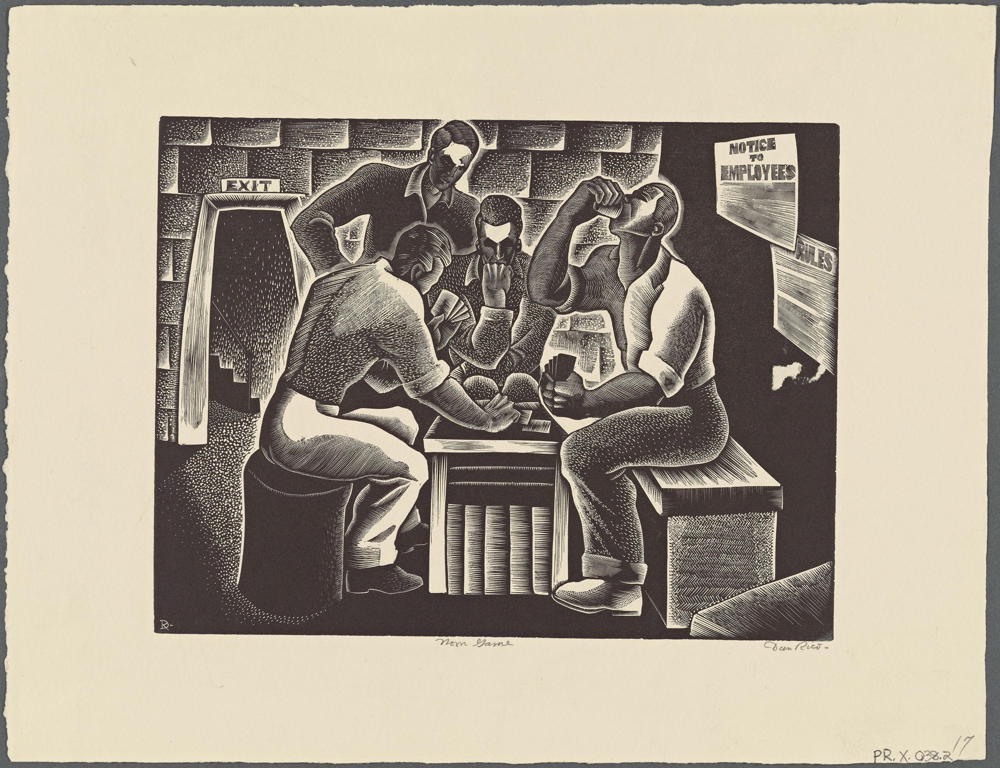
Dan Rico: Noon Game (1935 - 1943)
United States. Works Progress Administration
"My emotional crankcase drained …"
I had not remembered that ease when I'd suited up, even through the weeks leading up to the disruption. I'd undoubtedly struggled to suit up when I was down, but then I was not even pretending to enter any game. Suddenly, the act seemed more effortless than I ever remembered it seeming. I was BackInto the game again!
I feared my week's idleness might permanently eliminate my acceptance as a player.
ReEntry

Unknown Hopi carver:
Owa-nganroro [Mad Stone Eater Kachina],
(c. 1900, First Mesa, Arizona)
"Grace exclusively works in such mysterious ways."
As the Seasonal Affective Fog lifts, ReEntry emerges from the shadows. The exit had not been deliberate but mere side-effect. The resulting absence seems anything but profound. The symptoms typically linger. I'm always uncertain when to consider any bout over. I'll typically try ReEntry a tad too soon and feel rebuffed, but the sun still reliably comes up every morning, giving just as many second chances as necessary. Sometimes, I require a dozen second chances to finally find my traction. By then, I'm as thoroughly disgusted with myself as I can imagine, though should I fail at ReEntry that morning, I'll find an opportunity to better my recent record.
I am nobody's prodigal son.
Recovery

Edmond-François Aman-Jean: Reverie (c. 1900)
"The patient seems to be Recovering this morning."
With my self-diagnosis of Seasonal Affective Disorder came the emerging realization that I might already be recovering. Diseases and disorders do not just settle in and stay, not usually, not always. They pass through, first rendering us clueless about what might be ailing us or if we're even ailing. These visitors follow a progression from barely there to almost gone, leaving their benefactor or victim in some state of Recovery afterward. Recovery is where I integrate whatever that latest brush might have attempted to teach me. It's where I might freshly revel in same-old activities. It's where symptoms turn vestigial, and effects increasingly become intangible. Memories linger, though, of self-doubt and revelation, exhaustion and foreboding, and a particular haunting uncertainty. The Muse was convinced I had some bug. I believed I had lost my backbone and began slacking. Whatever the lessons, if any, I continue assimilating and integrating in Recovery.
I'm still naive enough to believe that everything probably happens for a reason and that my job primarily consists of determining underlying reasons and making some sense of them.
AintNoCure
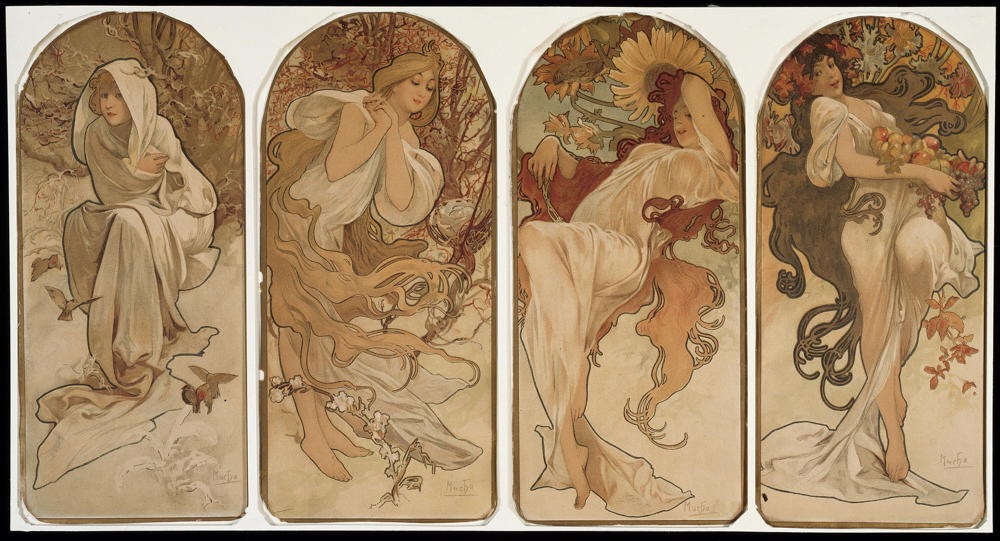
Alphonse Marie Mucha: The Seasons (1897)
" … an infinite game perhaps intended to encourage the pursuit of happiness …"
"There Ain't No Cure For The Summertime Blues." - common folk wisdom
In the deepest and darkest days of a typical January, some notable percentage of the population will at any time suffer the effects of what's labeled Seasonal Affective Disorder (SAD). The effects tend to be mild to moderate depression, said to be caused by light deprivation. Common treatments include exposure to broad-spectrum lighting and long naps. Many escape South to become what we call Snow Birds. Some even become extremists and purchase second houses in places where the sun always shines, like Arizona and extreme Southern New Mexico, abandoning their more Northern homesteads half the time. Zealots might move to some awful place like Florida full-time to escape these effects.
There ain't no actual cure for January's Seasonal Affective Disorder, though there are treatments.
Weekly Writing Summary For The Week Ending 7/11/2024
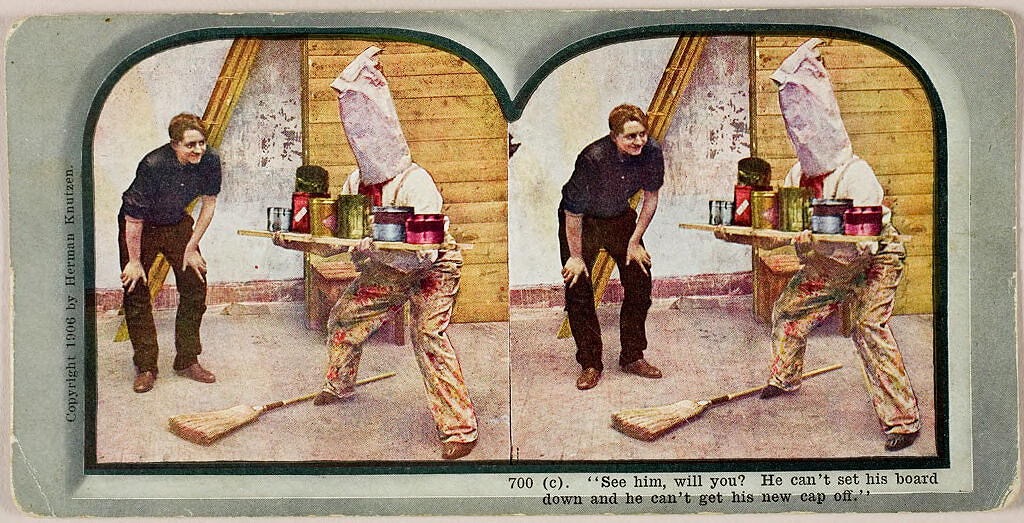
Unidentified Artist, stereoscopic photograph,
"See him, will you? He can't set his board down,
and he can't get his new cap off." (700 c), (c. 1906)
What Was Never Realistically Figure-outable
I'd thought I'd banished the notion that intelligent people were smarter and leaders could lead, but I keep finding vestiges of my initial innocent beliefs. These wound me because I long ago proved that I could not live up to such fictional expectations. In my time, I have carried the titles but have yet to fulfill the naive expectations. My smarts were balanced with at least a counterbalancing amount of stupids. My leadership required some followership, too. As I've insisted before, I was never once an island and not even a half-decent isthmus. I remain connected to much I'd long ago hoped to out-grow or divorce. Anyone who ever divorced learned that there's no such thing. It's just another fiction. I rarely manifested anybody's overly advertised ideals, or believably wrote about them. But then, nobody's likely to purchase the guide for becoming the imperfect anything. Asperation requires absolute fealty to some impossible ideal. We thrive and also die on our dichotomies.
I stand shivering at the end of another humbling writing week, appreciating your presence here and quietly wondering what's kept you coming back. I remain supremely unworthy of your presence, for I have always been mumbling here, trying to figure out what was never realistically figure-outable. Thank you for following along!
—
Weekly Writing Summary
This Grace Story reports the sorry state of my Clutter, a presence I often struggle to justify. I sometimes think I should produce better than Clutter without always recognizing the Grace it represents.
Jean-Baptiste-Siméon Chardin: The Attributes of the Arts and the Rewards Which Are Accorded Them (1766)
" … poor but honest penmanship …"
—
This Grace Story finds me happily Uncluttering after mentioning my Clutter in yesterday's story. It's funny how this universe sometimes seems to work this way. Just mentioning can start a chain of reactions that makes a real difference.
Unknown Artist: Panel of Uncut “Slip” Designs, Hemp, plain weave; embroidered with silk in tent stitches (1625-75)
—
This Grace Story finds me enjoying the only enjoyable time in the Summer Heat, the wee hours when the world feels moist.
Angelo Caroselli: Summer (c. 1620s)
"Grace appears in these most unlikely places."
—
I went to bed last night feeling every bit as incompetent as I've ever felt. This morning, it dawned on me again just how overrated competence has always been. That's the subject of this Grace Story, Competence.
Gordon W. Gahan: Star's Daughter (Eleventh -- End of Set): "I am interested in becoming a good actress, not a movie star. If I happen to become a star, too, I'd love every minute of it, of course. But my first goal is to become a competent actress."(1964-65)
"It's by the Grace of something far less than any of us that we ever manage to succeed."
—
The original version of this Grace Story was indescribably better than this one, but the original was lost to the ages after I'd gotten a little AheadOfMyself. The Universe attempted to teach me a lesson this morning about the dangers of living in lines.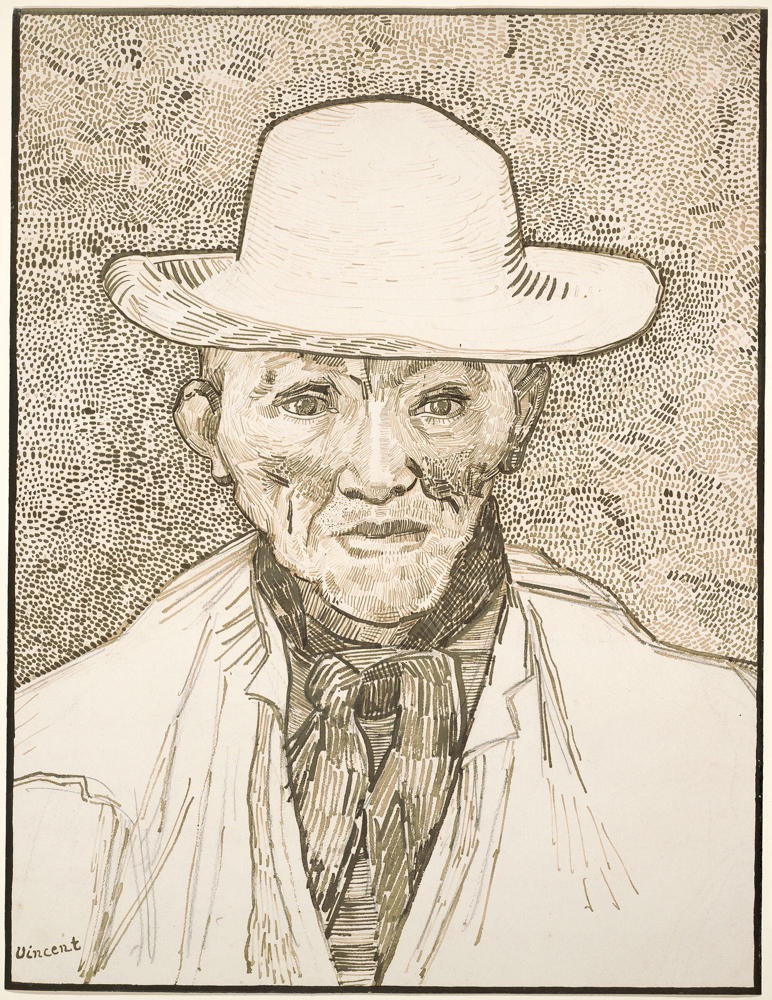
Vincent van Gogh: Paysan de la Camargue [Peasant of the Camargue, Portrait of Patience Escalier] (1888)
"We do not live in lines."
—
This Grace Story includes no Grace in it. It only implies its presence within an explanation of a True Impossible, a HaveToWantToCant.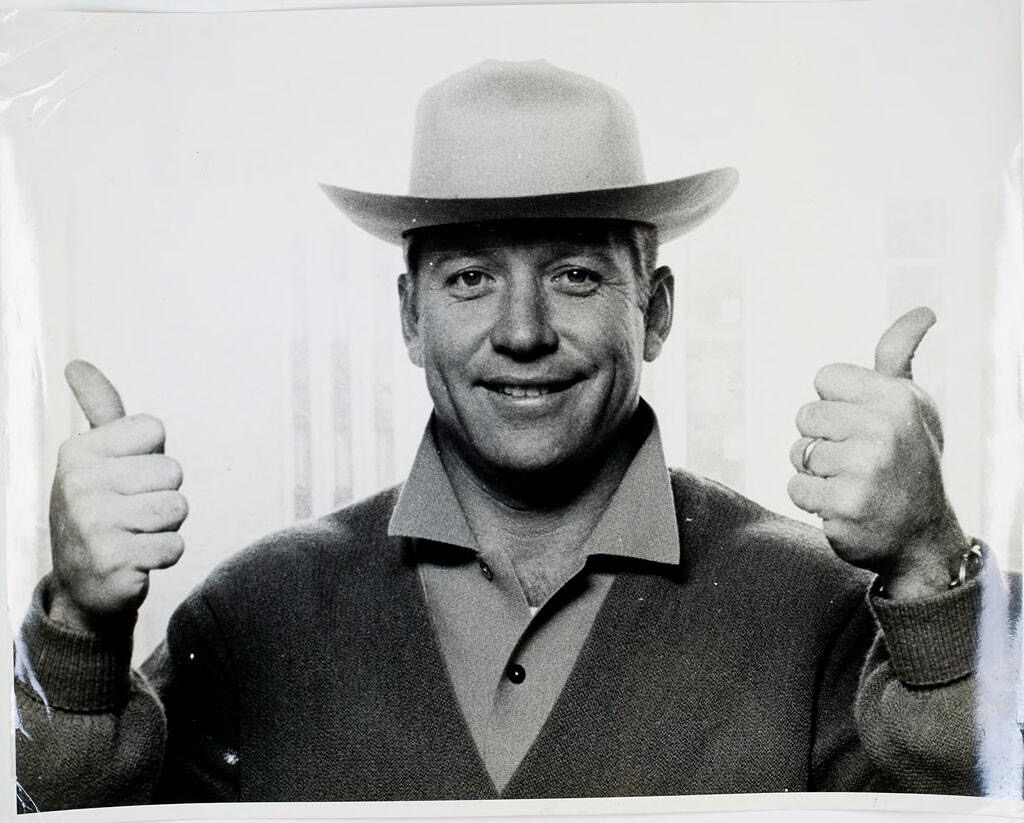
Gordon W. Gahan: Taking no notice of a troublesome right shoulder, New York Yankee star Mickey Mantle manages a "thumbs up" sign as he overlooks the Mayo Clinic from his hotel room here on January 17th. The champion slugger will undergo nearly a week of tests at the clinic to see if the shoulder can be fixed up. Before starting on the grueling series of examinations, Mantle remarked, "It isn't sore, but I can't throw with it." (January 1966)
"I must be dealing with a true impossible here."
—
I mentioned in one of my stories this week that all the possible combinations present in every fifty-two playing card deck have yet to result from all the diligent shufflings they've so-far been subjected to. It shouldn't surprise me to realize that I've barely nicked the possible configurations of a week's writings. If I can muster enough trust in the universe, a fresh perspective will emerge every morning, right on time. A few of the resulting perspectives do not honestly seem all that fresh, but each has been different enough, if not entirely different. I'd imagined that I'd eventually exhaust the possibility of posting any new material, but that has definitely not been the case. I'd thought I share that last half-decent Dad Joke and be done with this audacious experiment, but that hasn't happened yet, either. I have more than fifty-two cards in my deck. Clutter came up in the never-to-be-repeated rotation, and did its brother, Uncluttering. The Heat this Summer's delivering also made an appearance. I encountered one of my abiding incompetences in Competence before catching myself getting a little Agead Of Myself. I ended this writing week immersed in a Truly Impossible, a Want To, Have To, But Can't. One of those occasions no one ever actually rises to. Thank you for following along!
©2024 by David A. Schmaltz - all rights reserved
HaveToWantToButCant

Gordon W. Gahan: Taking no notice of a troublesome right shoulder, New York Yankee star Mickey Mantle manages a "thumbs up" sign as he overlooks the Mayo Clinic from his hotel room here on January 17th. The champion slugger will undergo nearly a week of tests at the clinic to see if the shoulder can be fixed up. Before starting on the grueling series of examinations, Mantle remarked, "It isn't sore, but I can't throw with it." (January 1966)
"I must be dealing with a true impossible here."
My senses usually keep me safe from directly experiencing many of the more terrifying realities. It's true that I'm hurling through space on a corkscrewing planet moving at 67,000 mph, or 18.5 miles per second. I sense none of this. Likewise, I hang upside down on the face of this planet while directly sensing none of that, either. My sense of the possible shares some of this blesséd blindness, for I cannot directly determine possibility, either. Much of my work emerges under Wait And See conditions. I can talk myself out of something without directly knowing just how possible it might have been to produce. More telling, I can just as easily talk myself into starting something that will later turn out to be an impossible. Knowing which it might become often proves the most impossible, for will sometimes determines way. Other times, no amount of will can translate into any feasible way. We only ever learn this later.
The run-of-the-mill Impossible might well seem eminently doable at the outset.
AheadOfMyself

Vincent van Gogh: Paysan de la Camargue [Peasant of the Camargue, Portrait of Patience Escalier] (1888)
"We do not live in lines."
I just "lost" my first hour of writing. I hadn't managed to do that in years. I'd grown careful and cautious. As one who measures my progress in captured words, I never approach my work in a cavalier fashion. I tend to be deliberate to a fault, following patterns varying little from session to session. I set up my page before setting to work, saving often, as if sighing. This morning, I must have forgotten to sigh. I inadvertently sorted my collection of stories by something other than the usual Date Created. I had not anticipated that I could have sorted them by Title instead, and there's only a tiny checkmark in the corner of the column label to indicate that the underlying list has even been sorted.
The list made no sense.
Competence

Gordon W. Gahan: Star's Daughter (Eleventh -- End of Set):
"I am interested in becoming a good actress, not a movie star.
If I happen to become a star, too,
I'd love every minute of it, of course.
But my first goal is to become a competent actress." (1964-65)
"It's by the Grace of something far less than any of us that we ever manage to succeed."
Competence has always been overrated. Most of the best that has ever been accomplished has been achieved by those who have yet to be fully qualified to produce such works. The writer, who was considered unpublishable until she squeezed out that best seller. The artist who lived in an unheated garret through most of his life and whose oeuvre now graces The Louvre. We're all of us essentially Bozos on this bus, and, for sure, always were.
It's not that we haven't tried to create effective certification programs; they're over-enrolled.
Heat

Angelo Caroselli: Summer (c. 1620s)
"Grace appears in these most unlikely places."
Summer turns merciless when July Heat arrives. Days bleach the lawn a buff-brown, and the gardens cower, praying for their morning or evening shower. The hanging pots need watering every morning, or they'll wither in the late afternoon sun. There's nothing to be done. I can work outside until noon. Then, I must flee back inside to hibernate until evening. I go effectively nocturnal, and the light seems more of a hindrance than helpful. Cold showers come back into fashion. It's not the Heat so much, but the humility of restricted latitude of movement. I daresn't go on a whim. I need a pretty darned good reason to venture out into it. It brings no discernable benefit.
They still say, "At least it's a dry heat."
Uncluttering

Unknown Artist: Panel of Uncut “Slip” Designs,
Hemp, plain weave; embroidered with silk in tent stitches (1625-75)
Sometimes, but only sometimes, naming a condition starts the process of resolving it. So it was yesterday when I called out my Clutter before, later, tucking in to clear out some of it. I spent most of my day Uncluttering. If only it were also so easy. I feel grateful that it IS sometimes just that simple.
I've long held that I have an ethical responsibility to discuss whatever's not supposed to be discussed, for undiscussables hold special powers.
Clutter

Jean-Baptiste-Siméon Chardin:
The Attributes of the Arts
and the Rewards Which Are Accorded Them (1766)
" … poor but honest penmanship …"
My desk belies my self-conception as a tidy person. Perhaps I once was neat, but an honest appraisal would conclude that I am no longer well-ordered. My desk holds the residue of innumerable works in progress, some of which I finished. I've always struggled with creating permanent records. I maintain no files, just piles that continue accumulating. To put anything "away" seems the equivalent of losing it.
With the death of a dear friend last month, I've started wondering what sort of legacy I'll leave.
Weekly Writing Summary For The Week Ending 7/04/2024

Henry Peach Robinson:
When the Day’s Work is Done,
A combination print made from six different negatives.
(1877, printed January 1890)
I Sleep Though My Julys
I dread July more than I dread the dead of Winter. Aside from the cool mornings, July days tend to turn punishingly warm. There's no escape until I turn on the sprinkler as the sun starts setting lower. The gardens exist balanced between scorched and saturated; whatever water I manage to apply early will be evaporated out by the end of most days. It's exhausting just failing to keep up. The gardens start producing, though, and the evenings, once the sun sets and the sprinkler's done its magic, compel us to eat on the back deck instead of in front of whatever's streaming. The TV's not been turned on in more than a week, and I'm not missing it. If I'm up by two, I have plenty of time to finish my writing before the sun starts to blind me. I can maintain my schedule as long as I'm out early. I hibernate most afternoons, remembering a soft blanket my mom used to spread on the living room floor before inviting me to nap through the blistering early afternoon hours. It was cool on the floor, and I could never keep my eyes open. I sleep through my Julys just like I doze through my Decembers.
Wronking

Utagawa Yoshifuji:
Five Men Doing the Work of Ten Bodies
(Gonin jushin no hataraki) 1861
"Let nobody say that I compromised and delivered anything the easy way!"
I was wrong on several levels when I assumed that work would become easier as I aged. I presumed that I would naturally become more experienced so that my prior knowledge would accumulate to the point that I might only rarely feel baffled. Almost precisely the opposite has proven true. I find myself freshly baffled with virtually every engagement, with experience proving to be lousy preparation for whatever presents itself next. Contrary to my earlier theory of ever-expanding competence, my proficiencies wain. This feels more painful than I might have imagined. After decades of living without much ego involvement, I've lately started suffering from a wounded ego, a debilitating if rarely fatal condition that nonetheless feels alarming. My best intentions sneer back at me these days.
I have heard of people who claim to enjoy learning.
RootDirectory

William Trost Richards: Tree Roots (19th-20th century)
"May the Grace of perseverance preserve my sanity in the face of this unending inanity."
I recently complained here about the new and improved Google Apps, for they seemed to have been specially designed to be unusable. Further use has led me to a deeper understanding that they were not new or improved but rely upon a now ancient design, one I had until recently managed to avoid learning. They employ the same form as MS-DOS' old hierarchical directory design, one so counter-intuitive as to seem unusable to anyone not entrained to comprehend it. I do not know how one comes to learn how to use RootDirectories and such. I know they offer few clues about navigating within and around them. I'm suddenly back to the primitive hunt-and-peck stage, often bewildered and frozen without a clue what to do next. If The Muse isn't around to advise, I stay frozen until after she returns.
The Muse is barely civil when I ask her one of my questions, for she learned about RootDirectories ages ago.
Convertible

Jack Rodden Studio: Untitled
[dignitaries riding in convertible in town parade]
(c. 1950)
"Grace even catches up to politicians when they ask nicely enough."
Political campaigns look different from the inside. Outside looking in, an observer hopefully sees mostly what the candidate wants them to see. Scenes should seem carefully choreographed, scripts thoughtfully written and practiced, and presentations more or less perfect. Inside looking out, it's continually one damned thing after another, none of which seems quite right or even right-able. The ship seems like it's taking on too much water. The campaign started too late and seems to be falling ever further behind. The difference between inside and outside states gets to grate on the campaign team. Everything takes longer, costs more, and produces less. If not careful, the candidate and team might grow despondent. Were it not for the likely fact that the opposition has it worse, the effort would hardly seem worth it.
Take, for example, the simple idea of the candidate appearing in the Pasco Fourth Of July Parade, a tradition in this legislative district.
Memorial

Jan Verkade: Memory (1893)
" … he'll forever overlook his homecoming."
No death seems complete until the survivors attend a Memorial. These affairs range from simple to elaborate, family to community. They represent much more than merely the memory of the recently departed; they embody an utterly unique slice of the departed's community. We trivially insist that everyone's essential and nobody exists as an island, but few ever suspect the depth and breadth of anyone's circle until after that center departs. Then, it's as if the central point of orientation has left the building. Even those otherwise related to each other seem somewhat worse for the absence without that one additional degree of connection. For instance, I could have sworn my friend Gary lived as a virtual hermit these past few years, but legions showed up for his Memorial picnic, catered with a massive hauled-in barbeque rig and a separate chuckwagon bar.
I came with my requisite pocketful of words.
UnwantedInsight

JOHN SINGER SARGENT:
FUMÉE D'AMBRE GRIS [SMOKE OF AMBERGRIS] (1880)
"Grace often comes unbidden and unwanted, insisting upon differences we would not have chosen. Grace seems to trade in UnwantedInsights; acceptance serves as the medium of exchange."
I claim to be seeking truth, but I prefer confirmation. I'd much rather my preconceptions reveal the truth instead of my pretensions. I think of myself as an insight seeker, though I'm just as disconcerted as the least of us when an insight reveals some suddenly glaring shortcoming in my once so proud performances. I wanted to get it right the first time, if only because that rarely happens. I thrive on misconceptions, perhaps valiant attempts destined to undermine my best intentions. I frequently find this cycle unbearable. I retire, thinking myself especially put upon. I only suffer from sometimes especially virulent cases of The Normals, for progress might have always been achieved chiefly by discovering errors. Perfection could not have ever been an objective. Seeking the more perfect seems the more realistic perspective.
I can be confident that I will be capable of writing a better story than this one tomorrow, but I'm not inhabiting tomorrow yet and couldn't possibly.
HesitantHedonist

Alfred Stevens:
Hesitation (Madame Monteaux?) (c. 1867)
"Life cannot be fulfilled by merely satisfying obligations."
I love to weed my gardens. I'd rather be on my knees digging dirt than do anything else, although I do maintain a mental list of the activities I most enjoy. Curiously, on any given day, I'm unlikely to engage in any activity on that list. I prioritize otherwise, first dispatching obligations to satisfy expectations. Then, I'm more likely to engage in hygiene activities, cleaning up messes. While certain satisfactions come from completing these, I cannot honestly report that they please me. I'd rather be weeding. Still, I catch myself making excuses that delay me from engaging in this most favorite occupation. It might be too hot or too cold. I seem easily dissuaded as if I require perfect conditions to engage in this most perfect of all possible occupations.
This might say something about how I was raised.
Weekly Writing Summary For The Week Ending 6/27/2024

John Singer Sargent: Study of Two Bedouins (1905–6)
An Achingly Aspired-for Answer
We seem to be floating here and always have been floating. Nobody among all our forebears ever once experienced firm footing. They each slipped and slid, stumbled, and mumbled their way into whatever they eventually seemed to become. There were no shortcuts then, and none remain for any of us to leverage now. How will we survive? We might survive for now without any of us individually surviving much longer. The very purpose of this exercise must be rooted in its inevitable demise. We're short-lived, whatever we might devise. This means we must seek for purposes other than salvation or survival. However attractive notions of figuring might seem, we're clearly not born here to figure out anything, and certainly not for any plausible long run. We're dancing on next to nothing without the promise of transforming any of that surface into anything lasting. We enquire in lieu of knowing. We ask instead of answering. We wonder when we'd prefer to know. We might be here to inquire, not to resolve. It might be plenty and enough to manage what the best of our forebears manifested: a decent question, an achingly aspired-for answer, a hopeful presence, and a grateful denouement—a life. Thank you for following along this week!
GracePeriods

John Singer Sargent: An Artist at His Easel (1914)
"I was out-dated before this product was even released."
I'm terribly slow on the uptake these days. I seem to need more space and time than previously, and I find myself far less productive. Give me a deadline and I'm almost sure to miss it, usually for good reasons, but sometimes for lousy ones. For instance, I've been trying to learn how to use the new and "improved" GoogleDrive apps, and it's been an excruciating experience. They've been almost entirely redesigned, seemingly to impede performance improvement. I need to rediscover every function every time I try to use it. The passageway into the file list was hidden three or four layers beneath an unrelated link, so I often wander aimlessly. Doing anything takes longer and becomes more frustrating than I ever remember GoogleApps being capable of inducing before. I need a GracePeriod, acknowledgement that I’m typing with chopsticks, so everything will quite naturally take much longer than otherwise necessary. I am a beneficiary of this encumbering technology.
I need to forgive myself for my own unwanted trespasses.
Humbling
Charles Bird King: The Vanity of the Artist's Dream
Former Titles: The Anatomy of Art Appreciation
Poor Artist's Study
Still Life, The Vanity of An Artist's Dream
(1830)
"I deserve a Humbling cup filled with a bitter brew."
The scandal had broken the Friday before the Candidate Forum. The incumbent County Commissioner had been investigated for some incidents of incivility at the prior year's fair, where she'd pushed around some underlings and humiliated herself for no good purpose. Those of us supporting her opponent quietly cheered inside to see that she had decisively stumbled. There might be no way Jenny Mayberry could be reelected with this black mark on her record. She'd already conclusively proven herself to be an inept commissioner. She'd proposed raises for first responders and hired some more without considering how the county might pay for those changes. Then, she'd steadfastly refused to vote to increase taxes, saying she'd sworn not to raise taxes when running for office. The adult commissioners voted in favor of paying for her increases, and she'd set about blanketing the county with reelection signs, insisting she really cares about the county and its people.
The morning of the Candidate Forum, Jenny called in sick.
PickEmUp

Lucian and Mary Brown:
Untitled [boy playing with truck in sandbox] (c. 1950)
" … the continuing possibility of these strange convergences and Grace."
I'll start this story by declaring that I do not believe in The Prosperity Gospel or the often-touted Laws of Attraction. I believe this theory and practice amount to a cruel joke, a fraud perpetrated on innocent people who probably deserve better. That this fraud is often self-inflicted is no defense and might render it even more offensive. There are plenty who encourage such beliefs.
I admit to sometimes seeing evidence that, if I was unconvinced, might convince me that The Prosperity Gospel and The Laws of Attraction could be real.
Self-Sacrifice
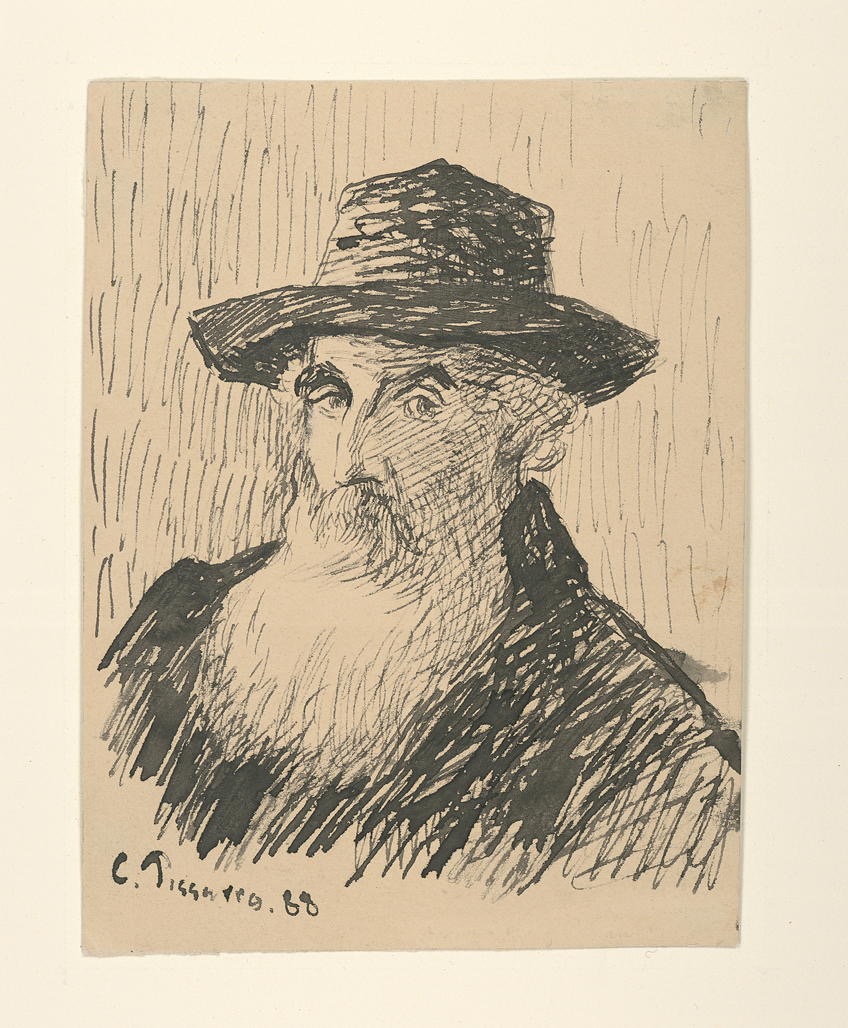
Camille Pissarro: Self-portrait (Undated, circa 1888)
"Never get yourself so busy not doing your job that you can't properly not do your job."
The Muse and I arrived at the convention hall feeling hopeful despite the frustrating time we'd had attempting to properly prepare for the experience. After reviewing the first draft of the party platform document, I'd started before the prior weekend to influence the final wording, which I found primitive and demeaning. Our Legislative District Chair first deflected my suggestion that he invite delegates to talk through the document to identify areas needing improvement. The Chair explained that he was too busy to convene anything before finally agreeing to try to schedule a session over the upcoming weekend. He hadn't scheduled the session, so The Muse and I arrived feeling as though we'd missed an opportunity to influence anything there.
Further, the day before, we'd learned that the platform committee on which our Chair had served had unanimously adopted a plank that could tank every candidate's opportunity for election in the current race.
Damns

J. H. W. Tischbein:
Three Beavers Building a Dam (c. 1800)
" … surrounded by the effects of our great-grandfather's profound ignorance."
All who live near the end of the Oregon Trail share a heritage. The valley I call my valley, the one they liked to well they named it twice, was once home to artesian wells. The groundwater was under such pressure that when a well was dug, the water would fountain up high into the air. That aquifer was filled with water that had taken twenty millennia to work its way down out of the mountains and under the valley floor. It could be removed in minutes on no more than a whim.
Our forebears were not system thinkers.
Grace

Adriaen van Ostade: Saying Grace (1653)
" … the best example of graceful aging I can imagine."
There but for the Grace of some God or Gods, went I. I have lived a remarkably fortunate existence, an unbidden gift for an unworthy recipient. I could ascribe all I have achieved to the presence of Grace, the free and unmerited favor of some God or Gods I very likely would not believe in if they were identified. I suppose this attitude alone qualifies me as a heathen. Now that I'm recognizably aging, I am urged to at least attempt to accomplish my aging gracefully, whatever in the Hell that injunction might mean. The Muse complains that I have been complaining about almost everything lately, and I reluctantly admit that I have been. Was I not supposed to complain about everything that failed to work as expected? Technology grows progressively—regressively—worse with every upgrade and innovation. Is this phenomenon evidence of technology aging gracefully? It might be that my pointing out the increasingly obvious shortcomings of Google Drive Apps amounts to one sort of Grace. My complaints beat going unconscious in the face of such disgraceful performances.
Grace might be the great undefinable.


